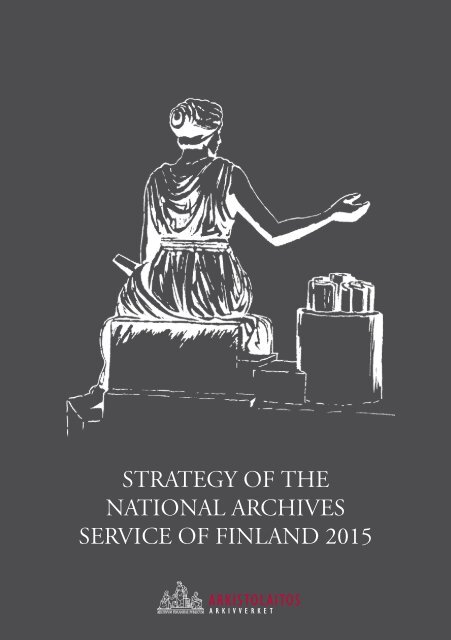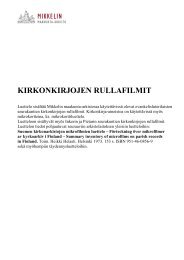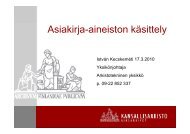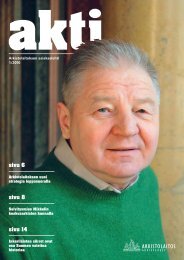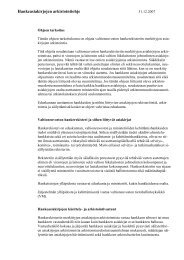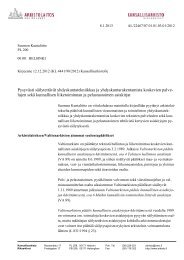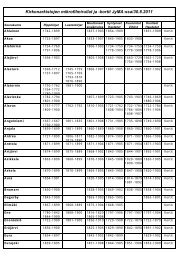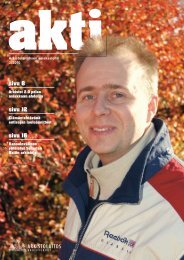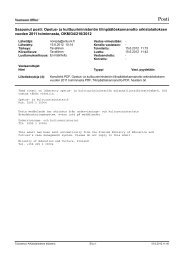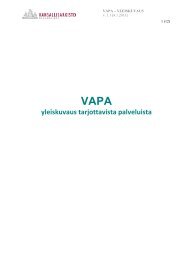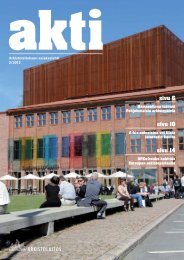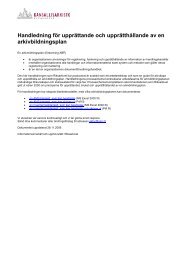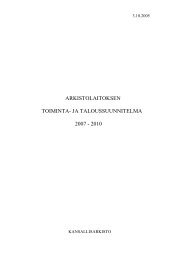strategy of the national archives service of finland 2015
strategy of the national archives service of finland 2015
strategy of the national archives service of finland 2015
Create successful ePaper yourself
Turn your PDF publications into a flip-book with our unique Google optimized e-Paper software.
STRATEGY OF THE<br />
NATIONAL ARCHIVES<br />
SERVICE OF FINLAND <strong>2015</strong>
Strategy <strong>of</strong> <strong>the</strong> National Archives<br />
Service <strong>of</strong> Finland <strong>2015</strong><br />
TABLE OF CONTENTS<br />
mission <strong>of</strong> <strong>the</strong> <strong>national</strong> <strong>archives</strong> <strong>service</strong> 5<br />
operational objectives and methods 6<br />
vision 8<br />
values 8<br />
Openness and confidentiality 9<br />
Impartiality 9<br />
Independence 9<br />
changing operational environment 10<br />
management and operational development 12<br />
life-cycle management <strong>of</strong> documentary information 14<br />
Guidance on life-cycle management 14<br />
Guidance through norms and standards 15<br />
Information, councelling and training 16<br />
Reception and acquisition <strong>of</strong> materials 17<br />
Private <strong>archives</strong> 19<br />
Research and development 21<br />
<strong>strategy</strong> <strong>of</strong> <strong>the</strong> <strong>national</strong> <strong>archives</strong> <strong>service</strong> <strong>of</strong> <strong>finland</strong> <strong>2015</strong> 3
making documentary cultural heritage available 24<br />
Ensuring preservation 24<br />
Archival construction and managing storage space 26<br />
Promoting availability 28<br />
Information <strong>service</strong>s 29<br />
Promoting visibility and awareness 31<br />
Library and information <strong>service</strong>s 33<br />
administrative <strong>service</strong>s and operational development 34<br />
Strategic planning, development and management support 34<br />
Resources 36<br />
Personnel and staff policy 38<br />
ICT <strong>service</strong>s 39<br />
Inter<strong>national</strong> activities 40<br />
Communications 41<br />
Mission <strong>of</strong> <strong>the</strong> National Archives Service<br />
The National Archives Service provides expertise and <strong>service</strong>s that make it possible to<br />
preserve archival material <strong>of</strong> importance for <strong>the</strong> individuals and <strong>the</strong> society in a compact,<br />
usable and easily available mode.<br />
The task <strong>of</strong> <strong>the</strong> National Archives Service is to ensure <strong>the</strong> preservation and availability<br />
<strong>of</strong> records belonging to <strong>the</strong> <strong>national</strong> cultural heritage, to promote research, and<br />
to guide as well as develop <strong>the</strong> management <strong>of</strong> <strong>archives</strong>.<br />
4 <strong>strategy</strong> <strong>of</strong> <strong>the</strong> <strong>national</strong> <strong>archives</strong> <strong>service</strong> <strong>of</strong> <strong>finland</strong> <strong>2015</strong> <strong>strategy</strong> <strong>of</strong> <strong>the</strong> <strong>national</strong> <strong>archives</strong> <strong>service</strong> <strong>of</strong> <strong>finland</strong> <strong>2015</strong> 5
Operational objectives and methods<br />
<strong>the</strong>se are <strong>the</strong> main strategic objectives <strong>of</strong> <strong>the</strong><br />
<strong>national</strong> <strong>archives</strong> <strong>service</strong>:<br />
1. The preservation and availability <strong>of</strong> documentary information preserved<br />
permanently and belonging to <strong>the</strong> <strong>national</strong> cultural heritage<br />
is ensured for <strong>the</strong> entire life cycle <strong>of</strong> <strong>the</strong> material, irrespective <strong>of</strong><br />
storage mode.<br />
2. The guidance <strong>of</strong> <strong>the</strong> National Archives Service on standards and<br />
information is clear, expert and up-to-date.<br />
3. The National Archives Service is a vital part <strong>of</strong> <strong>the</strong> <strong>national</strong> and<br />
inter<strong>national</strong> infrastructures for research in Humanities and Social<br />
Sciences.<br />
4. The information <strong>service</strong>s available via <strong>the</strong> Internet are a vital element<br />
in customer <strong>service</strong>s.<br />
5. Sufficient expertise, necessary resources and appropriate information<br />
systems for receiving, managing, and storing <strong>of</strong> electronic<br />
material, as well as making it available, are available.<br />
6. Private <strong>archives</strong> are acquired in accordance with a policy that<br />
ensures extensive, objective and sufficient holdings on all aspects <strong>of</strong><br />
participation in social life during various periods.<br />
7. The National Archives Service acquires appropriate and sufficient<br />
premises for operations and storage in accordance with a long-term<br />
construction schedule.<br />
8. The staff is motivated and has acquired high pr<strong>of</strong>essional skills in<br />
all fields <strong>of</strong> operation <strong>of</strong> <strong>the</strong> National Archives Service.<br />
<strong>the</strong> strategic objectives are met primarily<br />
through:<br />
1. Allocation <strong>of</strong> resources in line with <strong>the</strong> strategic objectives.<br />
2. Development <strong>of</strong> a unitary National Archives Service where knowhow<br />
and resources are utilized optimally.<br />
3. Enhancing efficiency in operational processes and management <strong>of</strong><br />
projects.<br />
4. Cooperation with strategic partners in order to promote productivity<br />
and cost-efficiency.<br />
5. Making <strong>the</strong> position <strong>of</strong> <strong>the</strong> National Archives Service clear in <strong>the</strong><br />
overall planning <strong>of</strong> life-cycle management <strong>of</strong> electronic material in<br />
<strong>the</strong> public administration.<br />
6. Long-term planning <strong>of</strong> operations and systematic monitoring <strong>of</strong><br />
set objectives by means <strong>of</strong> indicators projecting impact and efficiency<br />
and through evaluations.<br />
7. Training and recruitment that streng<strong>the</strong>ns <strong>the</strong> skills base.<br />
8. Promoting an atmosphere where innovative thinking skills, devotion<br />
to a set purpose, and pr<strong>of</strong>essional expertise are appreciated.<br />
9. Modern technology in customer <strong>service</strong>s and internal operations.<br />
10. Internal and external communications making a difference.<br />
6 <strong>strategy</strong> <strong>of</strong> <strong>the</strong> <strong>national</strong> <strong>archives</strong> <strong>service</strong> <strong>of</strong> <strong>finland</strong> <strong>2015</strong> <strong>strategy</strong> <strong>of</strong> <strong>the</strong> <strong>national</strong> <strong>archives</strong> <strong>service</strong> <strong>of</strong> <strong>finland</strong> <strong>2015</strong> 7
<strong>the</strong> key values guiding <strong>the</strong> operations <strong>of</strong> <strong>the</strong> <strong>national</strong><br />
<strong>archives</strong> <strong>service</strong> are:<br />
1) Openness and confidentiality<br />
2) Impartiality<br />
3) Independence<br />
openness and confidentiality<br />
The National Archives Service promotes free access by <strong>the</strong> public, transparency, and administrative<br />
openness. The guidelines on records management, <strong>the</strong> training and <strong>the</strong> access<br />
to material are always in accordance with good information management.<br />
Better availability <strong>of</strong> <strong>archives</strong> and records and efficient customer <strong>service</strong>s are key elements<br />
in <strong>the</strong> operations <strong>of</strong> <strong>the</strong> National Archives Service.<br />
Records and o<strong>the</strong>r materials are made available in accordance with regulations in<br />
force and terms and conditions <strong>of</strong> use agreed upon with private donors. Protection <strong>of</strong><br />
privacy and strict compliance with <strong>the</strong> terms and conditions for use <strong>of</strong> private <strong>archives</strong><br />
form <strong>the</strong> cornerstone to <strong>the</strong> trust shown towards <strong>the</strong> National Archives Service.<br />
Vision<br />
The National Archives Service is <strong>the</strong> most important <strong>national</strong> expert organization in<br />
<strong>the</strong> life-cycle management <strong>of</strong> documentary information, part <strong>of</strong> <strong>the</strong> research infrastructure<br />
and an information <strong>service</strong> facility that takes <strong>the</strong> increasingly inter<strong>national</strong><br />
nature <strong>of</strong> <strong>the</strong> operating environment into account in all operations.<br />
Values<br />
The values form <strong>the</strong> cornerstone <strong>of</strong> <strong>the</strong> operations <strong>of</strong> <strong>the</strong> National Archives Service<br />
and guide <strong>the</strong> approach towards customers, partners, and colleagues.<br />
The values <strong>of</strong> <strong>the</strong> National Archives Service are based on inter<strong>national</strong>ly recognized<br />
human values and on <strong>the</strong> ethical principles <strong>of</strong> <strong>the</strong> archival sector and <strong>the</strong> research<br />
community.<br />
impartiality<br />
Records and o<strong>the</strong>r materials in <strong>the</strong> <strong>archives</strong> are <strong>the</strong> foundation for forming a picture <strong>of</strong><br />
<strong>the</strong> history, culture and society <strong>of</strong> Finland in various periods. The acquisitions policy <strong>of</strong><br />
<strong>the</strong> National Archives Service ensures that adequate amounts <strong>of</strong> impartial and informative<br />
material <strong>of</strong> various participants in society are available in addition to <strong>of</strong>ficial <strong>archives</strong>.<br />
The National Archives Service serves all users in an equal manner. Good customer<br />
<strong>service</strong> and key material available online create equal opportunities for all customers to<br />
use <strong>the</strong> material irrespective <strong>of</strong> time and place.<br />
independence<br />
Archival materials are part <strong>of</strong> <strong>the</strong> cultural heritage <strong>of</strong> Finland and <strong>the</strong> world. The responsibility<br />
to future generations for acquiring archival material, making it available,<br />
and preserving it rests on <strong>the</strong> National Archives Service. All pr<strong>of</strong>essional activities <strong>of</strong> <strong>the</strong><br />
National Archives Service are performed regardless <strong>of</strong> political, religious, economic or<br />
any o<strong>the</strong>r objectives that could jeopardize confidence in <strong>the</strong> impartiality and independence<br />
<strong>of</strong> <strong>the</strong> National Archives Service.<br />
The National Archives Service complies with <strong>the</strong> Code <strong>of</strong> Ethics for Archivists<br />
adopted by <strong>the</strong> Inter<strong>national</strong> Council on Archives and <strong>the</strong> guidelines <strong>of</strong> <strong>the</strong> National<br />
Advisory Board on Research Ethics on good scientific practice and procedures for handling<br />
misconduct and fraud in science.<br />
8 <strong>strategy</strong> <strong>of</strong> <strong>the</strong> <strong>national</strong> <strong>archives</strong> <strong>service</strong> <strong>of</strong> <strong>finland</strong> <strong>2015</strong> <strong>strategy</strong> <strong>of</strong> <strong>the</strong> <strong>national</strong> <strong>archives</strong> <strong>service</strong> <strong>of</strong> <strong>finland</strong> <strong>2015</strong> 9
Changing operational environment<br />
<strong>the</strong> productivity programme and<br />
o<strong>the</strong>r savings measures in public finances<br />
call for a major re-evaluation <strong>of</strong> <strong>the</strong> National<br />
Archives Service as well as o<strong>the</strong>r<br />
functions and resources within <strong>the</strong> State<br />
administration. Ensuring sufficient resources<br />
for statutory tasks is <strong>the</strong> aim <strong>of</strong><br />
<strong>the</strong> National Archives Service in performance<br />
target negotiations with <strong>the</strong> Ministry<br />
<strong>of</strong> Education and Culture.<br />
The adopted policy <strong>of</strong> regionalization<br />
strives to maintain and streng<strong>the</strong>n knowhow<br />
and vitality outside major growth<br />
centres. The measures <strong>of</strong> regionalization<br />
and development within <strong>the</strong> State administration<br />
call for effective guidance on<br />
records management and a capacity for<br />
rapid and flexible reception <strong>of</strong> material<br />
for permanent storage and transfer to <strong>the</strong><br />
National Archives Service. Planning <strong>of</strong> logistics<br />
will become an increasingly important<br />
part <strong>of</strong> <strong>the</strong> operations.<br />
Cooperation between <strong>the</strong> state and<br />
municipal sectors will become closer in<br />
<strong>archives</strong> and records management, aiming<br />
at <strong>the</strong> coordinated use <strong>of</strong> public funding,<br />
better online <strong>service</strong>s, and cost savings.<br />
The National Archives, <strong>the</strong> Provincial<br />
Archives, and o<strong>the</strong>r authorities develop<br />
toge<strong>the</strong>r operational practices for better<br />
permanent storage and availability <strong>of</strong><br />
public-sector materials and more efficent<br />
customer <strong>service</strong>.<br />
The State administration is reorganized<br />
in order to promote <strong>the</strong> strategic agility<br />
<strong>of</strong> operators in <strong>the</strong> state sector and <strong>the</strong><br />
flexible, efficient use <strong>of</strong> resources. The National<br />
Archives Service will have to focus<br />
on core tasks. When resources for public<br />
administration are reduced, <strong>the</strong>re is a real<br />
danger <strong>of</strong> inadequate funding for records<br />
management tasks that are regarded as<br />
support <strong>service</strong>s. It will very soon affect<br />
<strong>the</strong> ability <strong>of</strong> agencies and authorities to<br />
manage material on paper and introduce<br />
online case management systems. The National<br />
Archives Service is prepared to receive<br />
materials <strong>of</strong> <strong>the</strong> state administration<br />
that are less than 40 years old as a <strong>service</strong><br />
subject to a fee.<br />
The construction <strong>of</strong> archival premises<br />
will be centralized due to <strong>the</strong> need for<br />
economizing. Material that has been digitized<br />
and so-called passive material can be<br />
stored in a central <strong>archives</strong> with nationwide<br />
coverage placed outside <strong>the</strong> Helsinki<br />
region. Whe<strong>the</strong>r <strong>the</strong> tasks <strong>of</strong> <strong>the</strong> Provincial<br />
Archives or <strong>the</strong> division into Archival<br />
Districts are appropriate will be evaluated<br />
at <strong>the</strong> beginning <strong>of</strong> <strong>the</strong> <strong>strategy</strong> period.<br />
Rendering <strong>the</strong> National Archives Service<br />
more effective as an integrated body is a<br />
strategic objective.<br />
The use <strong>of</strong> information networks is<br />
increasing in all <strong>service</strong>s <strong>of</strong>fered to <strong>the</strong><br />
public by <strong>the</strong> authorities. Operational<br />
procedures are harmonized in <strong>the</strong> public<br />
administration, which is developing its<br />
overall information management architecture.<br />
Structural cooperation between<br />
information <strong>service</strong> facilities is increasing<br />
in <strong>the</strong> production <strong>of</strong> <strong>service</strong>s. Digitizing<br />
and better availability <strong>of</strong> digital materials<br />
are given increasing consideration. The<br />
inter<strong>national</strong> dimension plays an increasingly<br />
important role in <strong>the</strong> use <strong>of</strong> electronic<br />
materials.<br />
Research and education are vital strategic<br />
areas that maintain and streng<strong>the</strong>n<br />
<strong>the</strong> competitiveness <strong>of</strong> Finnish society.<br />
Considerable investments are made into<br />
developing research infrastructures and<br />
<strong>the</strong> management <strong>of</strong> research information<br />
in Finland as well as inter<strong>national</strong>ly.<br />
Inter<strong>national</strong> standards and operating<br />
practices play an increasingly important<br />
role in <strong>the</strong> planning and executing <strong>of</strong> operations.<br />
Active participation in inter<strong>national</strong><br />
activities creates opportunities for<br />
developing appropriate information and<br />
storage systems and for directing activities<br />
and resources.<br />
The competition for skilled staff is becoming<br />
more intense. By directing and<br />
developing education provided at higher<br />
educational institutions, it will be possible<br />
to guarantee <strong>the</strong> competence needed<br />
by <strong>the</strong> National Archives Service. Taking<br />
an interest in <strong>the</strong> tasks <strong>of</strong> <strong>the</strong> National Archives<br />
Service and in records management<br />
opens <strong>the</strong> way to employment and makes<br />
it possible to obtain skilled employees.<br />
10 <strong>strategy</strong> <strong>of</strong> <strong>the</strong> <strong>national</strong> <strong>archives</strong> <strong>service</strong> <strong>of</strong> <strong>finland</strong> <strong>2015</strong> <strong>strategy</strong> <strong>of</strong> <strong>the</strong> <strong>national</strong> <strong>archives</strong> <strong>service</strong> <strong>of</strong> <strong>finland</strong> <strong>2015</strong> 11
Management and operational development<br />
• The archival legislation is up-to-date and gives <strong>the</strong> National Archives Service necessary<br />
backing in a rapidly changing operational environment. Competences and<br />
tasks <strong>of</strong> authorities or agencies are clearly defined.<br />
• Operational objectives and available resources are defined in <strong>the</strong> <strong>strategy</strong> <strong>of</strong> <strong>the</strong><br />
National Archives Service and in <strong>the</strong> agreements on performance guiding its operations.<br />
• Management and operational development based on <strong>the</strong> <strong>strategy</strong> are priority areas<br />
<strong>of</strong> <strong>the</strong> <strong>strategy</strong> period.<br />
• The organization model <strong>of</strong> <strong>the</strong> National Archives Service promotes efficient use <strong>of</strong><br />
resources and successful execution <strong>of</strong> core processes. The management system is<br />
based on process management for streng<strong>the</strong>ning <strong>the</strong> control <strong>of</strong> processes.<br />
• Management in <strong>the</strong> National Archives Service is transparent and aims at achieving<br />
set performance objectives. The outcome is evaluated through indicators and during<br />
development discussions.<br />
• Risk management is systematically taken into account. The conformity <strong>of</strong> operations<br />
to <strong>the</strong> law and <strong>the</strong>ir cost-effectiveness is monitored by internal auditors.<br />
ing <strong>of</strong> <strong>the</strong> tasks and <strong>the</strong> position <strong>of</strong> <strong>the</strong><br />
National Archives Service within public<br />
information management.<br />
The National Archives Service will<br />
carry out a comprehensive evaluation <strong>of</strong><br />
<strong>the</strong> legislation on <strong>the</strong> tasks <strong>of</strong> <strong>the</strong> National<br />
Archives Service early in <strong>the</strong> <strong>strategy</strong> period<br />
and will put forward a proposal on<br />
amendments that it considers necessary<br />
on <strong>the</strong> basis <strong>of</strong> <strong>the</strong> evaluation. The aim <strong>of</strong><br />
<strong>the</strong> reforms is to update <strong>the</strong> legislative basis<br />
to correspond to <strong>the</strong> online information<br />
management needs, practices and<br />
concepts within public administration<br />
and to define <strong>the</strong> competence <strong>of</strong> <strong>the</strong> National<br />
Archives Service in <strong>the</strong> overall planning<br />
<strong>of</strong> life-cycle management <strong>of</strong> electronic<br />
materials. Amendments <strong>of</strong> law will<br />
be carried out in broad cooperation with<br />
<strong>the</strong> tasks and competence <strong>of</strong> <strong>the</strong> National<br />
Archives Service have been specified<br />
in <strong>the</strong> Archives Act (831/1994) and<br />
<strong>the</strong> Decree on <strong>the</strong> National Archives<br />
Service (832/1994), both issued in 1994.<br />
The National Archives Service has been<br />
assigned additional tasks under <strong>the</strong> Act<br />
on Electronic Services and Communication<br />
in <strong>the</strong> Public Sector (13/2003) and<br />
under o<strong>the</strong>r legislation. The considerable<br />
investment made in developing online information<br />
<strong>service</strong>s by society, subsequent<br />
to <strong>the</strong> enactment <strong>of</strong> <strong>the</strong> Archives Act, has<br />
changed <strong>the</strong> operating practices <strong>of</strong> <strong>the</strong> authorities<br />
and brought into question current<br />
operating practices and lines <strong>of</strong> subordination.<br />
Online information <strong>service</strong>s<br />
within <strong>the</strong> public administration are rapidly<br />
developing, which calls for a redefinkey<br />
stakeholders in terms <strong>of</strong> <strong>the</strong> drafting<br />
process. The need to update regulations<br />
on records management included in o<strong>the</strong>r<br />
legislation on electronic administration<br />
will also be taken into account.<br />
The confirmed strategic policies will<br />
guide <strong>the</strong> long-term planning <strong>of</strong> <strong>the</strong> operations<br />
as well as <strong>the</strong> appropriate allocation<br />
<strong>of</strong> resources. The <strong>strategy</strong> <strong>of</strong> <strong>the</strong> National<br />
Archives Service forms <strong>the</strong> basis for <strong>the</strong><br />
performance negotiations held with <strong>the</strong><br />
Ministry <strong>of</strong> Education and Culture.<br />
Open, transparent and clear management<br />
is a vital element <strong>of</strong> success. The<br />
management objectives, responsibilities<br />
and decision-making powers are clearly<br />
defined in <strong>the</strong> management system, which<br />
is based on process management.<br />
During <strong>the</strong> <strong>strategy</strong> period, particular<br />
attention will be paid to developing management<br />
and <strong>the</strong> skills <strong>of</strong> managers. Management<br />
will be evaluated regularly in <strong>the</strong><br />
development reviews held at least once a<br />
year.<br />
The National Archives Service is organized<br />
in a manner facilitating <strong>the</strong> integrated<br />
use <strong>of</strong> resources, effective management<br />
and administration, as well as <strong>the</strong><br />
centralised implementation and reporting<br />
<strong>of</strong> projects and <strong>the</strong> practical implementation<br />
<strong>of</strong> results. Participation in <strong>national</strong> as<br />
well as inter<strong>national</strong> standardization is an<br />
integral part <strong>of</strong> <strong>the</strong> efforts to develop <strong>the</strong><br />
National Archives Service.<br />
In a rapidly changing environment, <strong>the</strong><br />
National Archives Service must be capable<br />
to develop its operations so that it can undertake<br />
its statutory duties. The resources<br />
and number <strong>of</strong> employees <strong>of</strong> <strong>the</strong> National<br />
Archives Service are confirmed during <strong>the</strong><br />
performance negotiations conducted with<br />
<strong>the</strong> Ministry <strong>of</strong> Education and Culture. In<br />
terms <strong>of</strong> operating expenditure, <strong>the</strong> National<br />
Archives Service must be in a similar<br />
position as o<strong>the</strong>r agencies operating in<br />
<strong>the</strong> administrative sector <strong>of</strong> <strong>the</strong> Ministry<br />
<strong>of</strong> Education and Culture.<br />
Internal auditors monitor <strong>the</strong> conformity<br />
to <strong>the</strong> law <strong>of</strong> <strong>the</strong> operations as<br />
well as <strong>the</strong> ability <strong>of</strong> <strong>the</strong> National Archives<br />
Service to carry out its core tasks in<br />
an efficient and appropriate manner. Risk<br />
management and internal control will be<br />
more tightly incorporated in <strong>the</strong> operating<br />
processes.<br />
The duties <strong>of</strong> <strong>the</strong> National Archives<br />
Service comprise <strong>the</strong> entire State administration.<br />
Decreasing resources will, however,<br />
require development and cutdowns<br />
<strong>of</strong> tasks. By developing risk analyses and<br />
internal planning, <strong>the</strong> National Archives<br />
Service intends to ensure that it can perform<br />
<strong>the</strong> tasks assigned to it. At <strong>the</strong> same<br />
time, an evaluation will be performed on<br />
which tasks it could relinquish and what<br />
<strong>the</strong> consequences would be for <strong>the</strong> records<br />
and <strong>archives</strong> management <strong>of</strong> <strong>the</strong> entire<br />
State.<br />
12 <strong>strategy</strong> <strong>of</strong> <strong>the</strong> <strong>national</strong> <strong>archives</strong> <strong>service</strong> <strong>of</strong> <strong>finland</strong> <strong>2015</strong> <strong>strategy</strong> <strong>of</strong> <strong>the</strong> <strong>national</strong> <strong>archives</strong> <strong>service</strong> <strong>of</strong> <strong>finland</strong> <strong>2015</strong> 13
Life-cycle management <strong>of</strong> documentary<br />
information<br />
guidance on life-cycle management<br />
• Guidance on <strong>the</strong> life-cycle management <strong>of</strong> documentary information produced<br />
by records creators falling under <strong>the</strong> Archives Act is a critical task <strong>of</strong> <strong>the</strong> National<br />
Archives Service. The availability <strong>of</strong> documentary information with permanent<br />
preservation value and its receipt for permanent storage are ensured through guidance,<br />
which also makes it possible to destroy o<strong>the</strong>r material as soon as it has become<br />
redundant.<br />
• The tasks and status <strong>of</strong> <strong>the</strong> National Archives Service in managing and storing electronic<br />
material have been defined as part <strong>of</strong> <strong>the</strong> guidelines on information management<br />
in public administration.<br />
• The norms guiding life-cycle management correspond to inter<strong>national</strong> standards<br />
and requirements on records management.<br />
• Guidance on life-cycle management requires coordination between units <strong>of</strong> <strong>the</strong><br />
National Archives Service as well as development <strong>of</strong> operations in a number <strong>of</strong> areas<br />
<strong>of</strong> responsibility and objective setting.<br />
determining <strong>the</strong> value <strong>of</strong> documentary<br />
information is part <strong>of</strong> <strong>the</strong> life-cycle<br />
management <strong>of</strong> records. It includes decision-making<br />
on permanent storage <strong>of</strong> information.<br />
Life-cycle management aims<br />
at determining <strong>the</strong> preservation value <strong>of</strong><br />
documentary information in a way that<br />
makes it possible already at an early stage<br />
<strong>of</strong> <strong>the</strong> life cycle to ensure <strong>the</strong> availability<br />
and preservation <strong>of</strong> material to be stored<br />
permanently, while o<strong>the</strong>r material can be<br />
destroyed as soon as it has become redundant.<br />
The National Archives Service intends<br />
to store an average <strong>of</strong> 10–15% <strong>of</strong> <strong>the</strong><br />
entire output <strong>of</strong> records by <strong>the</strong> authorities.<br />
Filing plans, efficient appraisal <strong>of</strong> material<br />
as well as guidance and advisory<br />
<strong>service</strong>s promote <strong>the</strong> management <strong>of</strong> documentary<br />
information and ensure that<br />
good records management practices are<br />
observed by <strong>the</strong> authorities.<br />
The Archives Act and terminology <strong>of</strong><br />
<strong>the</strong> archival sector will be brought to a level<br />
corresponding to <strong>the</strong> rapid development in<br />
guidance through norms and standards<br />
electronic records management. National<br />
records management standards will be updated<br />
in accordance with changes taking<br />
into consideration <strong>the</strong> inter<strong>national</strong> development<br />
and standardization.<br />
The Archives Act will be reformed in<br />
multilateral cooperation with partners.<br />
Current legislation on <strong>the</strong> life-cycle management<br />
<strong>of</strong> documentary material and <strong>the</strong><br />
need for updated regulations on records<br />
management will be taken into consideration<br />
during <strong>the</strong> preparatory drafting. The<br />
interface between responsibilities and powers<br />
<strong>of</strong> <strong>the</strong> National Archives Service and<br />
those <strong>of</strong> <strong>the</strong> Ministry <strong>of</strong> Finance as well as<br />
<strong>the</strong> forms <strong>of</strong> cooperation will be defined.<br />
The status <strong>of</strong> <strong>the</strong> National Archives Service<br />
within records management <strong>of</strong> <strong>the</strong> municipal<br />
sector will be evaluated with special<br />
regard to <strong>the</strong> availability <strong>of</strong> resources. The<br />
status and tasks <strong>of</strong> <strong>the</strong> Provincial Archives<br />
will be defined from <strong>the</strong> viewpoint <strong>of</strong> a<br />
strategic objective: to increase <strong>the</strong> efficiency<br />
<strong>of</strong> an integrated National Archives Service.<br />
• The National Archives Service produces understandable norms and standards for<br />
<strong>the</strong> authorities on records management. They can be easily applied in practice and<br />
promote operations. The National Archives Service monitors compliance with <strong>the</strong><br />
norms and standards that it has issued.<br />
• Guidance through norms and standards makes a seamless transfer to <strong>the</strong> National<br />
Archives Service <strong>of</strong> documentary materials to be permanently stored possible, ensuring<br />
safe permanent storage and facilitating efficient and reliable information<br />
<strong>service</strong> relating to <strong>the</strong>m.<br />
• The policy and <strong>strategy</strong> on appraisal will be updated, making it possible to capitalize<br />
on appraisal opportunities in an electronic environment. An appropriate proportion<br />
<strong>of</strong> <strong>the</strong> digital documentary information can be preserved due to <strong>the</strong> electronic<br />
storage system.<br />
14 <strong>strategy</strong> <strong>of</strong> <strong>the</strong> <strong>national</strong> <strong>archives</strong> <strong>service</strong> <strong>of</strong> <strong>finland</strong> <strong>2015</strong> <strong>strategy</strong> <strong>of</strong> <strong>the</strong> <strong>national</strong> <strong>archives</strong> <strong>service</strong> <strong>of</strong> <strong>finland</strong> <strong>2015</strong> 15
• The status <strong>of</strong> SÄHKE norms and standards in <strong>the</strong> public information management<br />
architecture has been defined. The practices relating to <strong>the</strong> authorization <strong>of</strong> electronic<br />
storage have been updated.<br />
• Guidance on norms and standards utilizes partnerships in <strong>the</strong> State administration<br />
and in <strong>the</strong> municipal sector which have been specified in <strong>the</strong> rulings for public<br />
ICT governance.<br />
particular criteria and methods<br />
for determining <strong>the</strong> value <strong>of</strong> born-digital<br />
documentary material and for <strong>the</strong> appraisal<br />
<strong>of</strong> such material will be prepared.<br />
Quantitative appraisal targets for documentary<br />
material will be specified.<br />
Organizational and information<br />
system-specific authorisations <strong>of</strong> perinformation,<br />
counselling and training<br />
manent electronic storage will be abandoned<br />
and technical and operational<br />
certification <strong>of</strong> systems will be introduced,<br />
requiring <strong>the</strong> suppliers <strong>of</strong> systems<br />
to apply for a SÄHKE certificate<br />
for <strong>the</strong>ir systems. The National Archives<br />
Service will clarify <strong>the</strong> accreditation procedure<br />
for <strong>the</strong> certifiers.<br />
• Information and counselling improves <strong>the</strong> performance <strong>of</strong> records management by<br />
<strong>the</strong> authorities, enhances <strong>the</strong> expertise <strong>of</strong> individuals responsible for records management,<br />
promotes documentary information practices in line with best practices, and<br />
safeguards <strong>the</strong> availability and preservation <strong>of</strong> <strong>the</strong> documentary cultural heritage.<br />
• Guidance through information includes written guidelines and handbooks, advice,<br />
consulting, and training events as well as examinations.<br />
• The National Archives Service supports training on records management and <strong>the</strong><br />
archival sector given by <strong>the</strong> universities.<br />
pr<strong>of</strong>essional and skilful records<br />
management is <strong>the</strong> best guarantee for preserving<br />
<strong>the</strong> <strong>national</strong>ly important documentary<br />
cultural heritage in an easily accessible<br />
form. Guidance provided by <strong>the</strong><br />
National Archives Service at every stage <strong>of</strong><br />
<strong>the</strong> life cycle <strong>of</strong> a document ensures <strong>the</strong><br />
competence and reliable records management<br />
practice <strong>of</strong> authorities.<br />
Administrative reforms and <strong>the</strong><br />
changes in operational culture toge<strong>the</strong>r<br />
with <strong>the</strong> large turnover <strong>of</strong> records management<br />
staff in public administration<br />
are a challenge to guidance through information.<br />
It needs to be innovative and<br />
flexible, in cooperation with key strategic<br />
partners.<br />
The fur<strong>the</strong>r, continuing training provided<br />
by <strong>the</strong> National Archives Service in<br />
<strong>the</strong> form <strong>of</strong> courses will be developed in<br />
accordance with changes in educational<br />
structures and demand. The regional<br />
equality <strong>of</strong> customers and opportunities<br />
<strong>of</strong>fered by online teaching will be given<br />
special attention when courses and <strong>the</strong>ir<br />
contents are planned. The <strong>of</strong>fered fur<strong>the</strong>r<br />
courses will focus on current vital <strong>the</strong>mes<br />
and on <strong>the</strong> content <strong>of</strong> development<br />
projects <strong>of</strong> <strong>the</strong> National Archives Service.<br />
New operational models will be developed<br />
for fur<strong>the</strong>r training in records management<br />
leading to an examination. The<br />
comprehensive reform <strong>of</strong> adult education<br />
and opportunities <strong>of</strong>fered by <strong>the</strong> system<br />
<strong>of</strong> competence-based examinations will<br />
be taken into consideration. The National<br />
Archives Service will mainly cooperate<br />
with <strong>the</strong> Board <strong>of</strong> Education and providers<br />
<strong>of</strong> training in <strong>the</strong> archival sector.<br />
The diversity <strong>of</strong> training given by <strong>the</strong><br />
universities is growing. The academic<br />
training on <strong>the</strong> highest level in records<br />
reception and acquisition <strong>of</strong> materials<br />
management will consequently be transferred<br />
from <strong>the</strong> National Archives Service<br />
to <strong>the</strong> universities. The National Archives<br />
Service will support universities in planning,<br />
implementing and developing <strong>the</strong><br />
content <strong>of</strong> education, and in providing<br />
students with practical pr<strong>of</strong>essional skills<br />
in <strong>the</strong> archival sector. This will ensure<br />
good correspondence <strong>of</strong> degrees taken at<br />
universities to <strong>the</strong> requirements <strong>of</strong> working<br />
life and promote employment <strong>of</strong> those<br />
taking <strong>the</strong> degrees.<br />
The necessity <strong>of</strong> a specialized vocational<br />
examination in records and <strong>archives</strong><br />
management will be investigated,<br />
and <strong>the</strong> status <strong>of</strong> <strong>the</strong> basic examination in<br />
records and <strong>archives</strong> management passed<br />
at <strong>the</strong> National Archives Service will be<br />
re-evaluated within <strong>the</strong> entire scope <strong>of</strong> archival<br />
training.<br />
• The Archives Act ensures <strong>the</strong> definition <strong>of</strong> <strong>of</strong>ficial archival material to be stored<br />
permanently according to a set <strong>of</strong> standards and its transfer to <strong>the</strong> National Archives<br />
Service for permanent storage.<br />
• In order to curb <strong>the</strong> increase in <strong>the</strong> amount <strong>of</strong> material to be received by <strong>the</strong> National<br />
Archives Service, old decisions on appraisal will be partially re-evaluated.<br />
The re-evaluation <strong>of</strong> appraisal decisions will be incorporated in <strong>the</strong> <strong>archives</strong> transfer<br />
reception plan.<br />
• Archives <strong>of</strong> <strong>the</strong> State authorities will be received to <strong>the</strong> extent possible for storage,<br />
subject to a fee, earlier than <strong>the</strong> normal 40-year transfer cycle would require.<br />
The early transfer <strong>of</strong> materials and destruction <strong>of</strong> materials to be kept for a fixed<br />
period will produce calculated savings for <strong>the</strong> State enterprise in reduced costs for<br />
premises and will improve <strong>the</strong> <strong>service</strong>s related to older materials.<br />
• The arranging and transfer <strong>of</strong> <strong>archives</strong> in less satisfactory order <strong>of</strong> public authorities,<br />
a process relating to reforms in regional State administration, has been implemented<br />
as separate projects. Regionalization objectives and opportunities to<br />
obtain <strong>national</strong> and European special funding for projects were taken into account.<br />
16 <strong>strategy</strong> <strong>of</strong> <strong>the</strong> <strong>national</strong> <strong>archives</strong> <strong>service</strong> <strong>of</strong> <strong>finland</strong> <strong>2015</strong> <strong>strategy</strong> <strong>of</strong> <strong>the</strong> <strong>national</strong> <strong>archives</strong> <strong>service</strong> <strong>of</strong> <strong>finland</strong> <strong>2015</strong> 17
as a general rule <strong>the</strong> National Archives<br />
Service will receive paper materials<br />
for permanent storage from records<br />
creators operating under <strong>the</strong> Archives Act<br />
when <strong>the</strong> material has reached <strong>the</strong> age <strong>of</strong><br />
40 years. As <strong>the</strong> authorities switch over to<br />
online case management systems, <strong>the</strong>y are<br />
<strong>of</strong>ten prepared to hand over paper material<br />
for permanent storage to <strong>the</strong> National<br />
Archives Service earlier than today.<br />
Accelerated transfers <strong>of</strong> paper materials<br />
for permanent storage open possibilities<br />
for more efficient space management<br />
in public administration and for significant<br />
cost savings and operational benefits<br />
in terms <strong>of</strong> State administration as a<br />
whole. Such transfers are, however, feasible<br />
only when units <strong>of</strong> <strong>the</strong> National Archives<br />
Service have at <strong>the</strong>ir disposal space<br />
that is not required for permanent storage<br />
<strong>of</strong> material transferred in accordance<br />
with <strong>the</strong> Archives Act. Storing material<br />
received earlier than <strong>the</strong> common transfer<br />
cycle would require is undertaken as<br />
a <strong>service</strong>, subject to a fee. The National<br />
Archives Service supports <strong>the</strong> measures <strong>of</strong><br />
<strong>the</strong> Ministry <strong>of</strong> Finance to make public<br />
administration practices more centralised.<br />
Several shelf-kilometres <strong>of</strong> <strong>archives</strong><br />
in less satisfactory order remain in <strong>the</strong><br />
martti kupiainen<br />
private <strong>archives</strong><br />
bour and work supervision. Experiences<br />
gained by <strong>the</strong> National Archives Service<br />
from similar previous projects and<br />
solutions relating to <strong>the</strong>m will facilitate<br />
<strong>the</strong> implementation <strong>of</strong> projects. These<br />
projects will take employment objectives<br />
into account and will capitalize on existing<br />
know-how.<br />
• Private <strong>archives</strong> are an essential complement to <strong>the</strong> view <strong>of</strong> Finnish society provided<br />
by <strong>archives</strong> <strong>of</strong> <strong>the</strong> authorities.<br />
• Securing in advance that materials represent key participants from different periods<br />
in society in an impartial, au<strong>the</strong>ntic, and sufficient way is <strong>the</strong> aim <strong>of</strong> <strong>the</strong> acquisition<br />
<strong>of</strong> private documentary material.<br />
• The National Archives Service guarantees <strong>the</strong> preservation <strong>of</strong> scientifically or culturally<br />
important documentary material in <strong>the</strong> possession <strong>of</strong> private individuals or<br />
organizations when <strong>the</strong> material is in danger <strong>of</strong> being destroyed or lost. Reception<br />
<strong>of</strong> electronic materials is being developed.<br />
• The National Archives is responsible for <strong>the</strong> developing division <strong>of</strong> tasks and cooperation<br />
between <strong>the</strong> National Archives Service, <strong>the</strong> private <strong>archives</strong> receiving State<br />
aid, municipal <strong>archives</strong>, local heritage <strong>archives</strong> and o<strong>the</strong>r information <strong>service</strong> institutions<br />
that collect and store private <strong>archives</strong>.<br />
• The private <strong>archives</strong> receiving State aid are responsible for <strong>the</strong> collecting and storing<br />
<strong>of</strong> <strong>national</strong>ly important documentary materials in <strong>the</strong>ir own special field. The<br />
National Archives monitors <strong>the</strong> effectiveness and impact <strong>of</strong> <strong>the</strong> operations <strong>of</strong> private<br />
<strong>archives</strong> receiving State aid and puts forward proposals to <strong>the</strong> Ministry <strong>of</strong> Education<br />
and Culture on developing <strong>the</strong> State aid system.<br />
Archives <strong>of</strong> <strong>the</strong> State authorities will be received to <strong>the</strong> extent possible for storage, subject to a fee, earlier<br />
than <strong>the</strong> normal 40-year transfer cycle would require.<br />
possession <strong>of</strong> authorities established as<br />
a result <strong>of</strong> <strong>the</strong> reforms in regional State<br />
administration as well as o<strong>the</strong>r administrative<br />
reforms. Getting <strong>the</strong>se <strong>archives</strong> in<br />
satisfactory transfer condition is being<br />
carried out as centralised joint ventures,<br />
looking for new cost-effective operational<br />
models <strong>of</strong> organization, financing, laprivate<br />
individuals and o<strong>the</strong>r private<br />
creators <strong>of</strong> <strong>archives</strong> have no statutory obligation<br />
to hand over <strong>the</strong>ir materials to <strong>the</strong><br />
National Archives Service or any o<strong>the</strong>r institution<br />
preserving such materials. Archives<br />
acquiring private materials should<br />
<strong>the</strong>refore be particularly active. The trust<br />
felt towards <strong>the</strong> National Archives Service<br />
is based on a strict honouring <strong>of</strong> principles<br />
and operating practices as expressed<br />
by donors <strong>of</strong> <strong>archives</strong> and compliance<br />
with <strong>the</strong> donation agreements.<br />
The National Archives Service strives<br />
through proactive measures to secure <strong>the</strong><br />
acquisition <strong>of</strong> scientifically important materials<br />
owned by private individuals and<br />
organizations. Acquisition <strong>of</strong> private materials<br />
produced by participants in society<br />
who are currently under-represented in<br />
<strong>the</strong> <strong>archives</strong> in comparison with <strong>the</strong>ir in-<br />
18 <strong>strategy</strong> <strong>of</strong> <strong>the</strong> <strong>national</strong> <strong>archives</strong> <strong>service</strong> <strong>of</strong> <strong>finland</strong> <strong>2015</strong> <strong>strategy</strong> <strong>of</strong> <strong>the</strong> <strong>national</strong> <strong>archives</strong> <strong>service</strong> <strong>of</strong> <strong>finland</strong> <strong>2015</strong> 19
fluence will be emphasized. O<strong>the</strong>r priority<br />
areas include <strong>the</strong> documentation <strong>of</strong> <strong>the</strong><br />
war period and <strong>the</strong> special phenomena <strong>of</strong><br />
<strong>the</strong> post-war years, as well as <strong>the</strong> changes<br />
in Finnish society since <strong>the</strong> 1980s, particularly<br />
immigration issues and <strong>the</strong> trend<br />
towards inter<strong>national</strong>isation. In order to<br />
ensure <strong>the</strong> preservation <strong>of</strong> private archival<br />
material <strong>of</strong> exceptional scientific or cultural<br />
importance, <strong>the</strong> National Archives<br />
Service exercises <strong>the</strong> authority granted in<br />
<strong>the</strong> Archives Act to buy or copy <strong>the</strong> material.<br />
Understanding <strong>of</strong> <strong>the</strong> importance <strong>of</strong><br />
private documentary material for historical<br />
research and for <strong>national</strong> self-understanding<br />
is promoted through communication.<br />
The National Archives Service<br />
promotes cultural aspirations (Kulturwille)<br />
that value documentary heritage<br />
and handing over <strong>of</strong> materials for preservation<br />
in <strong>archives</strong>.<br />
The acquisition and processing <strong>of</strong> private<br />
<strong>archives</strong> requires a disproportionate<br />
amount <strong>of</strong> efforts from institutions storing<br />
<strong>the</strong>m in comparison with <strong>the</strong> <strong>archives</strong> <strong>of</strong><br />
authorities. The arranging and cataloguing<br />
<strong>of</strong> <strong>archives</strong> transferred to <strong>the</strong> National<br />
Archives Service from private organizations<br />
should in, accordance with <strong>the</strong> objectives<br />
<strong>of</strong> <strong>the</strong> <strong>strategy</strong> period, be carried<br />
out with external financing and utilize<br />
strategic partnerships in o<strong>the</strong>r ways.<br />
The Advisory Committee on Private<br />
Archives <strong>of</strong> <strong>the</strong> National Archives promotes<br />
cooperation on a <strong>national</strong> level<br />
martti kupiainen<br />
between institutions receiving private <strong>archives</strong>.<br />
Goals include common principles<br />
on acquisition and storage, good coordination<br />
<strong>of</strong> operations between institutions,<br />
common registers on materials and strong<br />
emphasis on digitizing materials and online<br />
<strong>service</strong>s. Operational practices are<br />
developed for <strong>the</strong> reception <strong>of</strong> electronic<br />
private material exploiting experiences<br />
particularly in <strong>the</strong> o<strong>the</strong>r Nordic countries.<br />
IT features <strong>of</strong> <strong>the</strong> <strong>national</strong> register on<br />
private <strong>archives</strong> maintained by <strong>the</strong> National<br />
Archives Service will be updated.<br />
It will at <strong>the</strong> end <strong>of</strong> <strong>the</strong> <strong>strategy</strong> period<br />
include comprehensive reference data<br />
on <strong>the</strong> private <strong>archives</strong> stored by various<br />
memory organizations.<br />
The Act on State Aid for Private Archives<br />
(1006/2006) regulates <strong>the</strong> operations<br />
<strong>of</strong> <strong>the</strong> National Archives in allocating<br />
discretionary State aid. During <strong>the</strong><br />
<strong>strategy</strong> period, <strong>the</strong> National Archives<br />
will fur<strong>the</strong>r develop <strong>the</strong> indicators on effectiveness<br />
and impact <strong>of</strong> operations in<br />
private <strong>archives</strong> which receive State aid.<br />
The system <strong>of</strong> indicators creates <strong>the</strong> foundation<br />
for monitoring <strong>the</strong> operations <strong>of</strong><br />
<strong>archives</strong> receiving State aid and <strong>the</strong> appropriate<br />
allocation <strong>of</strong> State aid. The system<br />
<strong>of</strong> indicators takes into consideration <strong>the</strong><br />
special features and tasks <strong>of</strong> <strong>the</strong> <strong>archives</strong> in<br />
such a way that <strong>the</strong> system will promote<br />
cost-effective and efficient management<br />
<strong>of</strong> operations in <strong>the</strong>se institution.<br />
During 2011 <strong>the</strong> National Archives<br />
will make a comprehensive study <strong>of</strong> <strong>the</strong><br />
cost-effectiveness and impact <strong>of</strong> <strong>the</strong> State<br />
aid system for private <strong>archives</strong>. On <strong>the</strong><br />
basis <strong>of</strong> <strong>the</strong> study, <strong>the</strong> National Archives<br />
Service will make a proposal to <strong>the</strong> Ministry<br />
<strong>of</strong> Education and Culture in 2012<br />
on developing <strong>the</strong> State aid system. The<br />
purpose is to clarify <strong>the</strong> division <strong>of</strong> tasks<br />
<strong>of</strong> <strong>archives</strong> receiving State aid, to increase<br />
cooperation and to cut unnecessary costs.<br />
The National Archives Service strives to<br />
ensure that <strong>the</strong> funding for <strong>archives</strong> receiving<br />
statutory State aid will not proportionally<br />
fall below <strong>the</strong> development in <strong>the</strong><br />
resources <strong>of</strong> <strong>the</strong> National Archives Service.<br />
research and development<br />
The National Archives Service strives through proactive measures to secure <strong>the</strong> acquisition <strong>of</strong> scientifically<br />
important materials owned by private individuals and organizations.<br />
• Archives are a vital infrastructure particularly for research in Humanities and Social<br />
Sciences. The National Archives Service promotes research and develops and<br />
studies management <strong>of</strong> <strong>archives</strong>.<br />
• The National Archives Service promotes management <strong>of</strong> research information and<br />
strives to make comprehensive documentary information available for research as<br />
easily as possible. Digitization and online <strong>service</strong>s provide good access to materials<br />
in both Finnish and inter<strong>national</strong> research. The National Archives Service<br />
participates in research and development projects that improve <strong>the</strong> efficiency <strong>of</strong><br />
data management with universities and research institutes. The research projects<br />
are mainly implemented through external funding which is applied for separately.<br />
20 <strong>strategy</strong> <strong>of</strong> <strong>the</strong> <strong>national</strong> <strong>archives</strong> <strong>service</strong> <strong>of</strong> <strong>finland</strong> <strong>2015</strong> <strong>strategy</strong> <strong>of</strong> <strong>the</strong> <strong>national</strong> <strong>archives</strong> <strong>service</strong> <strong>of</strong> <strong>finland</strong> <strong>2015</strong> 21
• The National Archives Service supports <strong>the</strong> development <strong>of</strong> academic research<br />
on archival science. Promoting postgraduate training in special fields <strong>of</strong> importance<br />
for <strong>the</strong> National Archives Service is in focus. The skills <strong>of</strong> experts have been<br />
streng<strong>the</strong>ned, especially in managing electronic material.<br />
• The National Archives Service participates in inter<strong>national</strong> research and development<br />
projects that enhance its <strong>the</strong>oretical expertise, in projects promoting development<br />
<strong>of</strong> inter<strong>national</strong> standards and practices and in projects increasing <strong>the</strong> use <strong>of</strong><br />
Finnish documentary cultural heritage in inter<strong>national</strong> research.<br />
• At <strong>the</strong> start <strong>of</strong> <strong>the</strong> <strong>strategy</strong> period, <strong>the</strong> National Archives Service will draw up in<br />
cooperation with universities a comprehensive research <strong>strategy</strong> for <strong>the</strong> entire <strong>strategy</strong><br />
period, paying attention to <strong>the</strong> functions <strong>of</strong> <strong>the</strong> National Archives Service as a<br />
research infrastructure.<br />
<strong>the</strong> <strong>national</strong> <strong>archives</strong> <strong>service</strong> is an<br />
important <strong>national</strong> infrastructure for research,<br />
preserving materials <strong>of</strong> particularly<br />
vital importance for <strong>the</strong> research in History<br />
and Social Sciences. The digitization<br />
<strong>strategy</strong> <strong>of</strong> <strong>the</strong> National Archives Service<br />
peab oy<br />
will be updated during <strong>the</strong> <strong>strategy</strong> period<br />
in accordance with inter<strong>national</strong> developments<br />
in research information management<br />
practices and in order to provide<br />
better availability <strong>of</strong> data. The National<br />
Digital Library creates <strong>the</strong> framework for<br />
digitization and for online use and storage<br />
<strong>of</strong> digitized materials. The National Archives<br />
Service is responsible for <strong>the</strong> developing<br />
<strong>of</strong> a system for permanent storage<br />
<strong>of</strong> <strong>the</strong> electronic material <strong>of</strong> <strong>the</strong> National<br />
Digital Library in a manner agreed upon<br />
with <strong>the</strong> Ministry <strong>of</strong> Education and Culture<br />
and o<strong>the</strong>r partners.<br />
Changes in online case management<br />
require comprehensive redefinitions <strong>of</strong><br />
archival terminology and key concepts.<br />
The strong position <strong>of</strong> <strong>the</strong> National Archives<br />
Service in <strong>the</strong> issuing <strong>of</strong> standards<br />
requires guidelines that use clear and unambiguous<br />
terminology. Efforts are being<br />
made to rapidly improve <strong>the</strong> level <strong>of</strong> <strong>the</strong>oretical<br />
expertise so that <strong>the</strong> National Archives<br />
Service can be responsible for <strong>the</strong><br />
guidance that falls under its responsibility<br />
and for <strong>the</strong> management <strong>of</strong> research data.<br />
Fur<strong>the</strong>r scientific training <strong>of</strong> <strong>the</strong> staff will<br />
be supported primarily through employment<br />
arrangements.<br />
Research into records management focuses<br />
on <strong>the</strong> entire life cycle <strong>of</strong> documentary<br />
information and how it is managed<br />
in organizations in <strong>the</strong> public and private<br />
sector. The research carried out in <strong>the</strong> National<br />
Archives Service is applied research<br />
where <strong>the</strong> object is to fur<strong>the</strong>r practical development<br />
<strong>of</strong> records management. Universities<br />
are responsible for basic research,<br />
which is both supported by <strong>the</strong> National<br />
Archives Service and utilized by it in accordance<br />
with its own needs.<br />
The position and tasks <strong>of</strong> <strong>the</strong> National<br />
Archives Service in <strong>national</strong> and inter<strong>national</strong><br />
management <strong>of</strong> research information<br />
will be specified at <strong>the</strong> start <strong>of</strong> <strong>the</strong><br />
<strong>strategy</strong> period. Inter<strong>national</strong> know-how<br />
will be utilized as effectively as possible.<br />
The National Archives Service supports<br />
<strong>the</strong> development <strong>of</strong> strong research<br />
organizations and units with extensive inter<strong>national</strong><br />
contacts and adequate critical<br />
mass in research. The National Archives<br />
Service participates in <strong>the</strong> activities and<br />
development <strong>of</strong> Memornet, <strong>the</strong> Finnish<br />
Research Education Network on <strong>the</strong><br />
Memory Functions <strong>of</strong> Society, which is<br />
<strong>the</strong> responsibility <strong>of</strong> <strong>the</strong> Department <strong>of</strong><br />
Information Studies <strong>of</strong> <strong>the</strong> University <strong>of</strong><br />
Tampere.<br />
The National Archives Service will finalize<br />
a separate research <strong>strategy</strong> at <strong>the</strong><br />
start <strong>of</strong> <strong>the</strong> <strong>strategy</strong> period. Particular attention<br />
will be attached to research fields<br />
that have received little attention in university<br />
research, e.g., Conservation and<br />
Heraldry. The National Archives, acting<br />
as <strong>the</strong> heraldic <strong>of</strong>fice <strong>of</strong> Finland, will focus<br />
on streng<strong>the</strong>ning expertise in heraldry<br />
by capitalizing on inter<strong>national</strong> cooperation.<br />
Materials preserved by <strong>the</strong> National Archives Service are utilized particularly in research in History<br />
and Social Sciences.<br />
22 <strong>strategy</strong> <strong>of</strong> <strong>the</strong> <strong>national</strong> <strong>archives</strong> <strong>service</strong> <strong>of</strong> <strong>finland</strong> <strong>2015</strong> <strong>strategy</strong> <strong>of</strong> <strong>the</strong> <strong>national</strong> <strong>archives</strong> <strong>service</strong> <strong>of</strong> <strong>finland</strong> <strong>2015</strong> 23
Making documentary cultural heritage<br />
available<br />
ensuring preservation<br />
• The preservation <strong>of</strong> material has been ensured under an action plan for conservation,<br />
digitization and micr<strong>of</strong>ilming, which is based on an assessment <strong>of</strong> <strong>the</strong> condition<br />
<strong>of</strong> material in every unit <strong>of</strong> <strong>the</strong> National Archives Service. Preservation practices<br />
and methods are developed in cooperation with <strong>the</strong> National Archives. Planning<br />
for catastrophic situations will be enhanced.<br />
• The National Archives Service is responsible for <strong>the</strong> processes <strong>of</strong> receiving and storing<br />
electronic materials. The technological environment for storage <strong>of</strong> material<br />
and s<strong>of</strong>tware expertise has been outsourced.<br />
• The storage <strong>of</strong> electronic material constitutes a permanent item <strong>of</strong> expenditure in<br />
<strong>the</strong> budget <strong>of</strong> <strong>the</strong> National Archives Service.<br />
• Creators <strong>of</strong> records get assistance through centralised arranging and renovation<br />
projects aimed at <strong>the</strong> State administration when <strong>the</strong> required funding is granted.<br />
peab oy<br />
at <strong>the</strong> start <strong>of</strong> 2010 <strong>the</strong> holdings <strong>of</strong> <strong>the</strong><br />
National Archives Service exceeded 180<br />
shelf-kilometres <strong>of</strong> permanently stored<br />
documentary material from eight centuries<br />
as well as approximately 1.7 million<br />
maps and drawings. These holdings were<br />
in largely varying shape. The large transfers<br />
<strong>of</strong> records in <strong>the</strong> coming years to <strong>the</strong><br />
National Archives Service will enhance<br />
<strong>the</strong> need for proactive measures that ensure<br />
that <strong>the</strong> materials are in good condition<br />
and arranged satisfactorily.<br />
Preservation <strong>of</strong> original material in<br />
<strong>the</strong> National Archives Service will be safeguarded<br />
in accordance with an action plan<br />
for conservation, digitization and micr<strong>of</strong>ilming<br />
based on <strong>the</strong> review <strong>of</strong> condition<br />
<strong>of</strong> materials completed at <strong>the</strong> beginning <strong>of</strong><br />
<strong>the</strong> <strong>strategy</strong> period. The plan will consider<br />
<strong>the</strong> processing and protection <strong>of</strong> material<br />
and <strong>the</strong> quality <strong>of</strong> storage facilities. Storage<br />
development in <strong>the</strong> National Archives<br />
Service is a sectoral activity with objectives<br />
decided upon annually as part <strong>of</strong> performance<br />
agreements concluded with <strong>the</strong> units<br />
<strong>of</strong> <strong>the</strong> National Archives Service.<br />
Plans for catastrophic situations are<br />
developed toge<strong>the</strong>r with <strong>the</strong> National Library.<br />
Establishing sufficient capacity to<br />
quickly protect and conserve damaged<br />
material is extremely important. The protection<br />
<strong>of</strong> special material, development<br />
<strong>of</strong> mass deacidification and plans for catastrophes<br />
are included in <strong>the</strong> planning for<br />
new central <strong>archives</strong> <strong>of</strong> <strong>the</strong> National Archives<br />
Service. Planning for catastrophic<br />
situations will be enhanced through increased<br />
inter<strong>national</strong> cooperation.<br />
Particular attention is paid to storage<br />
conditions and protective materials,<br />
especially archival boxes. At <strong>the</strong> start <strong>of</strong><br />
<strong>the</strong> <strong>strategy</strong> period, <strong>the</strong> possibility <strong>of</strong> replacing<br />
boxes made <strong>of</strong> material unsuitable<br />
for storage will be looked into. New<br />
boxes with attached barcodes or some corresponding<br />
system would improve space<br />
management and facilitate <strong>the</strong> efficient<br />
use <strong>of</strong> material in information <strong>service</strong> operations.<br />
Guidelines <strong>of</strong> <strong>the</strong> National Archives<br />
Service to creators <strong>of</strong> records will<br />
be updated. The expertise in conservation<br />
will be enhanced through increased inter<strong>national</strong><br />
cooperation.<br />
The National Archives Service is preparing<br />
for <strong>the</strong> launch during 2011 <strong>of</strong><br />
<strong>the</strong> reception, storage and <strong>service</strong> system<br />
(VAPA) for electronic material. Implementation<br />
<strong>of</strong> <strong>the</strong> system requires <strong>the</strong> termining<br />
<strong>of</strong> <strong>the</strong> project phase and adaptation<br />
to normal operations <strong>of</strong> <strong>the</strong> National<br />
Archives Service. The amount <strong>of</strong> electronic<br />
materials will increase dramatically,<br />
and <strong>the</strong>y will be received for permanent<br />
storage at a considerably earlier date than<br />
paper materials.<br />
Maintenance and development <strong>of</strong> <strong>the</strong><br />
electronic reception, storage and <strong>service</strong><br />
system will require considerable resources,<br />
permanently, also after <strong>the</strong> introduction<br />
<strong>of</strong> <strong>the</strong> system. External providers will<br />
maintain <strong>the</strong> availability <strong>of</strong> electronic material<br />
as well as <strong>the</strong> equipment and storage<br />
capacity required for electronic storage.<br />
These <strong>service</strong>s and necessary technological<br />
expertise provided by external partners<br />
will be bought. The VAPA system will be<br />
developed as part <strong>of</strong> <strong>the</strong> entire system for<br />
public information management.<br />
There are still many risk elements related<br />
to <strong>the</strong> storage <strong>of</strong> electronic materials<br />
24 <strong>strategy</strong> <strong>of</strong> <strong>the</strong> <strong>national</strong> <strong>archives</strong> <strong>service</strong> <strong>of</strong> <strong>finland</strong> <strong>2015</strong> <strong>strategy</strong> <strong>of</strong> <strong>the</strong> <strong>national</strong> <strong>archives</strong> <strong>service</strong> <strong>of</strong> <strong>finland</strong> <strong>2015</strong> 25
due to <strong>the</strong> fact that <strong>the</strong> technology is new<br />
and inter<strong>national</strong> experience is limited.<br />
For that reason, micr<strong>of</strong>ilming is still used<br />
inter<strong>national</strong>ly as one <strong>of</strong> <strong>the</strong> means for ensuring<br />
<strong>the</strong> preservation <strong>of</strong> paper materials<br />
and key electronic records. The National<br />
Archives Service will evaluate <strong>the</strong> necessity<br />
for micr<strong>of</strong>ilming and COM-transfer<br />
<strong>of</strong> digital files to micr<strong>of</strong>ilm in material<br />
storage and implement <strong>the</strong> results during<br />
<strong>the</strong> <strong>strategy</strong> period.<br />
The National Archives and <strong>the</strong> Provincial<br />
Archives are responsible for <strong>the</strong> monitoring<br />
<strong>of</strong> materials that come up for sale in<br />
<strong>the</strong>ir districts <strong>of</strong> operations. The National<br />
Archives is responsible for legal actions and<br />
for digitizing <strong>of</strong> materials taken into possession.<br />
In order to reduce <strong>the</strong> inconveniences<br />
caused to owners by <strong>the</strong>se measures,<br />
<strong>the</strong> digitization <strong>of</strong> materials taken into possession<br />
will always be given high priority.<br />
In order to safeguard archival materials<br />
<strong>the</strong> National Archives Service will introduce<br />
guidelines for customers and staff<br />
on handling <strong>of</strong> material, and implement<br />
required practices. Consideration will be<br />
given to internal controls and safety in accordance<br />
with <strong>the</strong> <strong>archives</strong> report adopted<br />
in 2008 by <strong>the</strong> Commission <strong>of</strong> <strong>the</strong> European<br />
Union. The National Archives Service<br />
will join <strong>the</strong> inter<strong>national</strong> Liber networks,<br />
which was established to prevent<br />
<strong>the</strong>fts from libraries, <strong>archives</strong> and museums<br />
as well as illegal trading in materials.<br />
archival construction and managing storage space<br />
• The amount <strong>of</strong> documentary material falling under <strong>the</strong> responsibility <strong>of</strong> <strong>the</strong> National<br />
Archives Service will grow dramatically during <strong>the</strong> <strong>strategy</strong> period. The costefficiency<br />
and appropriateness <strong>of</strong> space management has been ensured by centralising<br />
construction and updating user logistics in <strong>the</strong> <strong>archives</strong>.<br />
• The need for storage space has been planned so that it makes flexible reception,<br />
subject to a fee, <strong>of</strong> records from <strong>the</strong> public administration for permanent storage<br />
possible.<br />
• Planning <strong>of</strong> space management in <strong>the</strong> National Archives Service is in accordance<br />
with <strong>the</strong> general efforts to centralise storage <strong>of</strong> material <strong>of</strong> <strong>the</strong> public administration.<br />
The National Archives Service will introduce a space management system enhancing<br />
centralised management <strong>of</strong> <strong>the</strong> premises for archival collections.<br />
<strong>the</strong> transfers <strong>of</strong> considerably increasing<br />
volumes <strong>of</strong> paper material to <strong>the</strong> <strong>archives</strong><br />
during <strong>the</strong> next decades will create<br />
a need for additional archival premises.<br />
The growth is only expected to decline at<br />
<strong>the</strong> start <strong>of</strong> <strong>the</strong> 2040s.<br />
Construction in <strong>the</strong> National Archives<br />
Service will focus on <strong>the</strong> regionally located<br />
central <strong>archives</strong> with nation-wide coverage<br />
which is planned in Mikkeli. Project planning<br />
will start at <strong>the</strong> beginning <strong>of</strong> <strong>the</strong> <strong>strategy</strong><br />
period. The first stage <strong>of</strong> <strong>the</strong> central<br />
<strong>archives</strong> building will be ready in 2017,<br />
making it possible to give up <strong>the</strong> premises<br />
at Sörnäinen when <strong>the</strong> lease agreement expires<br />
in spring 2018. Digitized materials<br />
<strong>of</strong> <strong>the</strong> National Archives Service and o<strong>the</strong>r<br />
so-called passive materials as well as material<br />
requiring special conditions will be<br />
concentrated <strong>the</strong>re. The National Archives<br />
Service will investigate <strong>the</strong> possibilities <strong>of</strong><br />
establishing a <strong>national</strong> mass deacidification<br />
centre for paper materials and a centre<br />
for catastrophe preparation in connection<br />
with <strong>the</strong> central <strong>archives</strong>.<br />
The National Archives<br />
Service will investigate <strong>the</strong> possibility<br />
<strong>of</strong> destroying paper materials<br />
to be stored permanently<br />
which have been digitized, provided<br />
that <strong>the</strong> scientific value<br />
and probative force <strong>of</strong> <strong>the</strong> material<br />
is not compromised. Material<br />
to be stored permanently<br />
and belonging to <strong>the</strong> <strong>national</strong><br />
documentary cultural heritage<br />
will be received from both <strong>the</strong><br />
Evangelical Lu<strong>the</strong>ran Church<br />
and <strong>the</strong> Orthodox Church in<br />
accordance with terms agreed<br />
upon by <strong>the</strong> preserving unit<br />
and <strong>the</strong> Ministry <strong>of</strong> Education<br />
and Culture ei<strong>the</strong>r as storage<br />
subject to a fee or free <strong>of</strong> charge.<br />
When authorities become subject<br />
to change, <strong>the</strong> National Archives<br />
Service will ensure that<br />
<strong>the</strong>y get <strong>the</strong>ir material to be<br />
stored permanently in proper<br />
order. Objectives will also be set<br />
in space planning for <strong>the</strong> storage<br />
<strong>of</strong> private <strong>archives</strong>.<br />
The National Archives Service is introducing<br />
a system that will improve <strong>the</strong><br />
efficiency <strong>of</strong> logistics for using <strong>the</strong> collections<br />
and space management. The system<br />
will contain information on <strong>the</strong> overall<br />
available capacity <strong>of</strong> <strong>the</strong> National Archives<br />
Service and <strong>the</strong> location <strong>of</strong> records. It can<br />
be introduced in 2012 after a preparatory<br />
stage if <strong>the</strong> Ministry <strong>of</strong> Education and<br />
Culture allocates resources for its acquisition.<br />
The deployment <strong>of</strong> a space management<br />
system will be combined with o<strong>the</strong>r<br />
solutions enhancing logistical operations<br />
The transfers <strong>of</strong> considerably increasing volumes <strong>of</strong> paper<br />
material to <strong>the</strong> <strong>archives</strong> during <strong>the</strong> next decades will create<br />
a need for additional archival premises.<br />
peab oy<br />
26 <strong>strategy</strong> <strong>of</strong> <strong>the</strong> <strong>national</strong> <strong>archives</strong> <strong>service</strong> <strong>of</strong> <strong>finland</strong> <strong>2015</strong> <strong>strategy</strong> <strong>of</strong> <strong>the</strong> <strong>national</strong> <strong>archives</strong> <strong>service</strong> <strong>of</strong> <strong>finland</strong> <strong>2015</strong> 27
and space management, e.g., placement<br />
in storage units according to <strong>the</strong> order <strong>of</strong><br />
arrival and replacing <strong>of</strong> archive boxes with<br />
new ones, marked with a barcode or some<br />
o<strong>the</strong>r automatic method <strong>of</strong> identification.<br />
The National Archives Service will<br />
reduce construction and storage costs by<br />
centralised extensive mass digitization <strong>of</strong><br />
paper materials to be received. The mass<br />
digitization will be outsurced and it will<br />
focus on materials that are suited to costeffective<br />
digitization, analogue or digital<br />
storage and paper material destruction<br />
procedures.<br />
In <strong>the</strong> construction <strong>of</strong> new facilities<br />
consideration will be given to energy saving<br />
solutions. Ei<strong>the</strong>r low- or passive-energy<br />
models will be applied. Energy consumption<br />
will also be reduced through<br />
structural solutions. In order to improve<br />
<strong>the</strong> efficiency <strong>of</strong> storage space, <strong>the</strong> latest<br />
promoting availability<br />
internal logistics techniques applicable<br />
to <strong>archives</strong> will be exploited. Planning <strong>of</strong><br />
construction will consider <strong>the</strong> most efficient<br />
design possible for <strong>the</strong> premises.<br />
Centralised construction will also take distances,<br />
access and availability into consideration.<br />
Aspects <strong>of</strong> efficiency will be taken<br />
into consideration in placing <strong>the</strong> material.<br />
The security culture relating to premises<br />
and materials will be developed fur<strong>the</strong>r.<br />
Archival buildings are constructed for<br />
an expected life-cycle <strong>of</strong> 200 years. Consideration<br />
will be given within <strong>the</strong> premises<br />
to <strong>the</strong>ir modifiability to cater for changing<br />
needs. The expansion <strong>of</strong> <strong>the</strong> operations<br />
will also be taken into consideration in allocating<br />
enough space for staff. The National<br />
Archives Service makes particularly<br />
good and active use <strong>of</strong> <strong>the</strong> culturally valuable<br />
building <strong>of</strong> <strong>the</strong> National Archives in<br />
cooperation with key strategic partners.<br />
• Documents needed by customers are easily found and available. Comprehensive<br />
search systems ensure <strong>the</strong> availability <strong>of</strong> information reducing <strong>the</strong> threat <strong>of</strong> marginalization<br />
<strong>of</strong> paper material as <strong>the</strong> popularity <strong>of</strong> electronic material increases.<br />
• The <strong>service</strong> channels <strong>of</strong> <strong>the</strong> National Archives Service are based on customer needs.<br />
Thematic and material-related information environments as part <strong>of</strong> online <strong>service</strong>s<br />
provide guidance on <strong>the</strong> use <strong>of</strong> materials and directories. The use <strong>of</strong> Wiki-type databases<br />
and o<strong>the</strong>r social media makes it possible for users to participate in content<br />
production.<br />
• The network architecture is clear. Wide-ranging online <strong>service</strong>s provide for <strong>the</strong><br />
needs <strong>of</strong> demanding scientific research as well as <strong>the</strong> various information needs <strong>of</strong><br />
<strong>the</strong> public.<br />
• Digitization <strong>of</strong> key material improves <strong>the</strong> availability <strong>of</strong> material. The digitization<br />
<strong>strategy</strong> has been drawn up with a focus on customers. Strategic partnerships support<br />
digitization.<br />
<strong>the</strong> <strong>national</strong> <strong>archives</strong> <strong>service</strong> is extensively<br />
developing its own information<br />
resources, focusing particularly on<br />
<strong>the</strong> ability <strong>of</strong> <strong>the</strong>se information resources<br />
and systems to communicate interactively<br />
and on <strong>the</strong> quality <strong>of</strong> <strong>the</strong> information in<br />
<strong>the</strong> systems. Developing <strong>the</strong> information<br />
architecture and <strong>the</strong> information system<br />
architecture is also in focus as well as integrating<br />
interfaces into a common information<br />
<strong>service</strong> level for <strong>the</strong> entire National<br />
Archives Service.<br />
Coherent descriptive information is<br />
required for <strong>the</strong> implementation <strong>of</strong> an<br />
electronic ordering and identification system<br />
and o<strong>the</strong>r online <strong>service</strong>s. The ordering<br />
and identification system is based<br />
on <strong>the</strong> policies <strong>of</strong> <strong>the</strong> National Archives<br />
Service on information architecture, taking<br />
into consideration <strong>the</strong> policies and<br />
implementation <strong>of</strong> <strong>the</strong> National Digital<br />
Library. Practices <strong>of</strong> description are being<br />
developed taking into account <strong>the</strong> inter<strong>national</strong><br />
development in <strong>the</strong> archival sector<br />
and <strong>the</strong> need for common search systems<br />
in memory organizations.<br />
The National Archives Service is improving<br />
<strong>the</strong> appropriate allocation and<br />
efficient use <strong>of</strong> its resources through target-oriented<br />
cooperation carried out with<br />
information <strong>service</strong>s<br />
strategic partners. The object is to create<br />
additional value for all partners by combining<br />
resources and through systematic<br />
joint ventures. Clear objectives are set for<br />
cooperation carried out with various strategic<br />
partners and <strong>the</strong> parties agree on <strong>the</strong><br />
allocation <strong>of</strong> resources for activities. Cooperation<br />
is monitored and reported on<br />
using <strong>the</strong> project management tools <strong>of</strong> <strong>the</strong><br />
National Archives Service.<br />
The digitization <strong>strategy</strong> forms a basis<br />
for digitization and conservation. The acquisition<br />
<strong>of</strong> external financing for digitization<br />
will be intensified. Various research<br />
projects applying for funding will be reminded<br />
by <strong>the</strong> National Archives Service<br />
<strong>of</strong> <strong>the</strong> costs arising from digitization <strong>of</strong><br />
material and <strong>the</strong> corresponding benefits.<br />
The digitization <strong>strategy</strong> promotes<br />
o<strong>the</strong>r activities <strong>of</strong> <strong>the</strong> National Archives<br />
Service and new online <strong>service</strong>s making<br />
databases on <strong>the</strong> materials suitable for<br />
centralized information searches carried<br />
out through <strong>the</strong> National Digital Library.<br />
Particular attention will be paid to developing<br />
and improving <strong>the</strong> Portti <strong>service</strong><br />
which provides guidance on search methods<br />
as well as materials and directories.<br />
The electronic ordering system will make<br />
it possible to order materials online.<br />
• The information <strong>service</strong> activities <strong>of</strong> <strong>the</strong> National Archives Service are customer<br />
oriented. The core materials are available for customers free <strong>of</strong> charge in <strong>the</strong> archival<br />
premises.<br />
• Online <strong>service</strong>s are a key <strong>service</strong> channel also when paper materials are made available.<br />
Digital material is mainly used as an online self-<strong>service</strong>. Customer-oriented<br />
<strong>service</strong> packages toge<strong>the</strong>r with <strong>the</strong>matic and material-related information environ-<br />
28 <strong>strategy</strong> <strong>of</strong> <strong>the</strong> <strong>national</strong> <strong>archives</strong> <strong>service</strong> <strong>of</strong> <strong>finland</strong> <strong>2015</strong> <strong>strategy</strong> <strong>of</strong> <strong>the</strong> <strong>national</strong> <strong>archives</strong> <strong>service</strong> <strong>of</strong> <strong>finland</strong> <strong>2015</strong> 29
ments ensure that <strong>the</strong> online <strong>service</strong>s are easy to use. Materials subject to permission<br />
are available through electronic identification systems.<br />
• The National Archives Service promotes as well as implements <strong>the</strong> rapidly developing<br />
information management practices in scientific research.<br />
• Information <strong>service</strong> environments are wide-ranging and enable efficient shared use<br />
<strong>of</strong> directories, key documentary materials, online information <strong>service</strong>s as well as<br />
literature promoting <strong>the</strong> use <strong>of</strong> materials.<br />
<strong>the</strong> aim <strong>of</strong> <strong>the</strong> information <strong>service</strong>s <strong>of</strong><br />
<strong>the</strong> National Archives Service is, on <strong>the</strong><br />
one hand, to provide current customers<br />
with better <strong>service</strong> and, on <strong>the</strong> o<strong>the</strong>r, to<br />
acquire new customer groups. Operating<br />
models for defining <strong>the</strong> <strong>service</strong> needs <strong>of</strong><br />
customer relationships and customers are<br />
being devised. In developing information<br />
<strong>service</strong>s consideration will be given to customer<br />
feedback which is ga<strong>the</strong>red systematically.<br />
The National Archives Service<br />
strives toge<strong>the</strong>r with strategic partners to<br />
improve <strong>the</strong> availability <strong>of</strong> materials and<br />
<strong>the</strong> efficiency <strong>of</strong> information <strong>service</strong>. Cooperation<br />
with memory organizations in<br />
developing information <strong>service</strong>s will be<br />
streng<strong>the</strong>ned. New interactive<br />
tools are improving<br />
cooperation between customers,<br />
partners and <strong>the</strong><br />
National Archives Service.<br />
Visits to <strong>the</strong> reading<br />
rooms <strong>of</strong> <strong>the</strong> National Archives<br />
Service have steadily<br />
decreased since <strong>the</strong> turn <strong>of</strong><br />
<strong>the</strong> millennium. The increase<br />
in electronic materials<br />
made available by <strong>the</strong><br />
National Archives Service<br />
and o<strong>the</strong>r providers <strong>of</strong><br />
<strong>service</strong>s is one reason. Genealogy<br />
organizations in<br />
particular have actively started to <strong>of</strong>fer<br />
online <strong>service</strong>s. In order to improve <strong>the</strong><br />
use <strong>of</strong> its materials <strong>the</strong> National Archives<br />
Service is investing heavily in developing<br />
online <strong>service</strong>s. Policies on <strong>the</strong> structure<br />
and operating models <strong>of</strong> new online <strong>service</strong>s<br />
will be set out as part <strong>of</strong> <strong>the</strong> <strong>strategy</strong><br />
on making cultural heritage available and<br />
a corresponding programme <strong>of</strong> implementation<br />
will be drawn up at <strong>the</strong> start <strong>of</strong><br />
<strong>the</strong> <strong>strategy</strong> period.<br />
The interactive Portti <strong>service</strong> plays a<br />
key role in developing online <strong>service</strong>s. It<br />
provides users with search paths according<br />
to <strong>the</strong>ir interests leading to digitized<br />
and paper materials and directories <strong>of</strong> <strong>the</strong><br />
Online <strong>service</strong>s are a key <strong>service</strong> channel also when paper materials<br />
are made available.<br />
martti kupiainen<br />
National Archives Service and to links to<br />
<strong>service</strong>s <strong>of</strong> o<strong>the</strong>r memory organizations.<br />
Fur<strong>the</strong>rmore, it provides guidance to customers<br />
on using <strong>the</strong> materials and directories<br />
related to <strong>the</strong>m, exploiting <strong>the</strong> opportunities<br />
<strong>of</strong>fered by social media.<br />
Practices in research information<br />
management are changing rapidly in Finland<br />
and abroad. The National Archives<br />
Service participates in development activities<br />
based on <strong>national</strong> and European<br />
infrastructure policy, and promotes better<br />
use <strong>of</strong> materials for research.<br />
Plans are made in advance, before <strong>the</strong><br />
material has been received, on making<br />
promoting visibility and awareness<br />
new paper materials available. The needs<br />
for information <strong>service</strong>s and resources related<br />
to <strong>the</strong>se materials are evaluated and<br />
opportunities <strong>of</strong>fered by online <strong>service</strong>s<br />
are utlized in developing <strong>the</strong> appropriate<br />
processes <strong>of</strong> inquiry <strong>service</strong>.<br />
A centralised registry <strong>of</strong>fice will be established<br />
as a shared <strong>service</strong> point <strong>of</strong> <strong>the</strong><br />
National Archives Service, developing online<br />
<strong>service</strong>s. Records management in <strong>the</strong><br />
National Archives Service will be organized<br />
as an integrated system guiding <strong>the</strong><br />
systematic management <strong>of</strong> documentary<br />
information as part <strong>of</strong> <strong>the</strong> operating processes.<br />
• The presentations, exhibitions and publications increase awareness <strong>of</strong> materials in<br />
<strong>the</strong> custody <strong>of</strong> National Archives Service and <strong>of</strong> possible ways to use <strong>the</strong>m. They<br />
also promote awareness <strong>of</strong> <strong>the</strong> <strong>service</strong>s <strong>of</strong>fered by <strong>the</strong> National Archives Service<br />
and enhance <strong>the</strong> social impact <strong>of</strong> <strong>the</strong> National Archives Service and its materials.<br />
• User training and excursions are part <strong>of</strong> <strong>the</strong> pedagogical activities on <strong>archives</strong><br />
carried out by <strong>the</strong> National Archives Service. Exhibitions promote archival pedagogy<br />
and are vital for <strong>the</strong> corporate and public relations <strong>of</strong> <strong>the</strong> National Archives<br />
Service.<br />
• Visibility and awareness are promoted in a cost-effective way and through <strong>the</strong> use<br />
<strong>of</strong> social media. Basic <strong>service</strong>s are produced as online <strong>service</strong>s. The impact <strong>of</strong> <strong>the</strong><br />
operations is evaluated with <strong>the</strong> aid <strong>of</strong> effectiveness indicators.<br />
• The National Archives Service publishes both online publications and printed<br />
publications, which promote awareness <strong>of</strong> <strong>the</strong> National Archives Service and its<br />
materials and increase <strong>the</strong>ir use.<br />
<strong>the</strong> objectives, target groups and contents<br />
<strong>of</strong> archival pedagogy will be defined<br />
in <strong>the</strong> <strong>strategy</strong> on making cultural heritage<br />
available and a corresponding programme<br />
for implementation, which will<br />
be drawn up at <strong>the</strong> start <strong>of</strong> <strong>the</strong> <strong>strategy</strong> period.<br />
Annual performance objectives will<br />
be set for <strong>the</strong>se activities.<br />
Videos published online demonstrating<br />
<strong>the</strong> nature <strong>of</strong> <strong>the</strong> activities and materials<br />
toge<strong>the</strong>r with <strong>the</strong> <strong>the</strong>matic and material-related<br />
information environments <strong>of</strong><br />
30 <strong>strategy</strong> <strong>of</strong> <strong>the</strong> <strong>national</strong> <strong>archives</strong> <strong>service</strong> <strong>of</strong> <strong>finland</strong> <strong>2015</strong> <strong>strategy</strong> <strong>of</strong> <strong>the</strong> <strong>national</strong> <strong>archives</strong> <strong>service</strong> <strong>of</strong> <strong>finland</strong> <strong>2015</strong> 31
<strong>the</strong> Portti <strong>service</strong> play a key role in <strong>the</strong> archival<br />
pedagogic activities. An interactive<br />
learning environment supporting teaching<br />
in schools and in educational institutions<br />
will also be created for <strong>the</strong> Portti<br />
<strong>service</strong>. The learning environment will be<br />
planned toge<strong>the</strong>r with teachers.<br />
An annual sectorial plan will be made<br />
for <strong>the</strong> exhibitions, as an appendix to <strong>the</strong><br />
internal performance agreements <strong>of</strong> <strong>the</strong><br />
National Archives Service. The plan specifies<br />
<strong>the</strong> exhibitions to be organized by <strong>the</strong><br />
National Archives Service and <strong>the</strong> available<br />
personnel and financial resources for<br />
that purpose. Impact indicators will be<br />
developed for exhibition activities. Focus<br />
will lie on online exhibitions <strong>of</strong> digital<br />
material <strong>of</strong> <strong>the</strong> National Archives Service<br />
and o<strong>the</strong>r memory organizations.<br />
Knowledge <strong>of</strong> historically important<br />
materials in foreign <strong>archives</strong> throwing<br />
light on Finland and <strong>of</strong> material on<br />
relations between Finland and foreign<br />
states or inter<strong>national</strong> organizations is<br />
promoted through inter<strong>national</strong> cooperation<br />
on exhibitions and publications.<br />
Closer cooperation with <strong>archives</strong> in Russia<br />
and <strong>the</strong> Nordic countries promoting<br />
acquisition <strong>of</strong> copies <strong>of</strong> key collections<br />
from <strong>archives</strong> abroad will be a particular<br />
object.<br />
Promoting <strong>the</strong> visibility and general<br />
awareness <strong>of</strong> <strong>the</strong> National Archives Service<br />
is closely linked to <strong>the</strong> communication<br />
jacob brill<br />
<strong>strategy</strong>. The website <strong>of</strong> <strong>the</strong> National Archives<br />
Service will be developed in a manner<br />
giving users a clear overall impression<br />
<strong>of</strong> materials and <strong>service</strong>s provided by <strong>the</strong><br />
National Archives Service.<br />
PR activities aiming at a positive image<br />
are an aspect <strong>of</strong> communications promoting<br />
awareness <strong>of</strong> <strong>the</strong> National Archives<br />
Service. Cooperation particularly<br />
with <strong>the</strong> Ministry for Foreign Affairs and<br />
foreign diplomatic missions in Finland<br />
will continue as part <strong>of</strong> promoting <strong>of</strong> an<br />
all-round image <strong>of</strong> Finland based on documentary<br />
cultural heritage.<br />
The National Archives Service publishes<br />
both printed and electronic pub-<br />
library and information <strong>service</strong>s<br />
lications. The publications promote use<br />
<strong>of</strong> records in a scientifically reliable way<br />
and support <strong>the</strong> customer <strong>service</strong> activities<br />
<strong>of</strong> <strong>the</strong> National Archives Service. Cooperation<br />
with strategically important<br />
partners will be fur<strong>the</strong>red, particularly in<br />
electronic publishing. During <strong>the</strong> <strong>strategy</strong><br />
period, <strong>the</strong> National Archives Service will<br />
focus primarily on innovative publishing<br />
where <strong>the</strong> linking <strong>of</strong> digitized source<br />
materials to research publications is promoted.<br />
The strategic priorities in publishing<br />
will be specified in <strong>the</strong> <strong>strategy</strong> on<br />
making cultural heritage available. A programme<br />
for publishing activities will be<br />
drawn up during 2010.<br />
• The library <strong>of</strong> <strong>the</strong> National Archives is a special scientific library operating at <strong>the</strong><br />
<strong>national</strong> level. It supports research and access to information relating to <strong>the</strong> special<br />
fields <strong>of</strong> <strong>the</strong> National Archives Service.<br />
• The library and information <strong>service</strong>s streng<strong>the</strong>n and diversify <strong>the</strong> information<br />
<strong>service</strong> activities <strong>of</strong> <strong>the</strong> National Archives Service.<br />
Exhibitions promote awareness <strong>of</strong> <strong>the</strong> <strong>service</strong>s <strong>of</strong>fered by <strong>the</strong> National Archives Service and <strong>of</strong> material<br />
preserved <strong>the</strong>re.<br />
<strong>the</strong> libraries <strong>of</strong> <strong>the</strong> National Archives<br />
and <strong>the</strong> Provincial Archives serve employees<br />
as well as customers using <strong>the</strong>ir<br />
materials. Researchers have access key<br />
reference works and handbooks and may<br />
order monographs supporting use <strong>of</strong> archival<br />
material. The libraries <strong>of</strong> Provincial<br />
Archives focus particularly on compiling<br />
special provincial collections and<br />
on <strong>the</strong> library <strong>service</strong>s relating to <strong>the</strong>ir<br />
district. Efforts during <strong>the</strong> <strong>strategy</strong> period<br />
will focus on extensive use and acquisition<br />
<strong>of</strong> electronic publications. The<br />
libraries <strong>of</strong> <strong>the</strong> National Archives Service<br />
operate in cooperation with <strong>the</strong> National<br />
Library, o<strong>the</strong>r research libraries and <strong>the</strong><br />
<strong>national</strong> library network.<br />
The library <strong>of</strong> <strong>the</strong> National Archives<br />
is <strong>the</strong> only specialized <strong>national</strong> research library<br />
operating in archival science, diplomatics,<br />
heraldry and sigillography. It is responsible<br />
for contacts with inter<strong>national</strong><br />
research libraries in <strong>the</strong>se fields where it<br />
provides special <strong>service</strong>. The personnel <strong>of</strong><br />
<strong>the</strong> library are qualified in information<br />
and library <strong>service</strong>s.<br />
32 <strong>strategy</strong> <strong>of</strong> <strong>the</strong> <strong>national</strong> <strong>archives</strong> <strong>service</strong> <strong>of</strong> <strong>finland</strong> <strong>2015</strong> <strong>strategy</strong> <strong>of</strong> <strong>the</strong> <strong>national</strong> <strong>archives</strong> <strong>service</strong> <strong>of</strong> <strong>finland</strong> <strong>2015</strong> 33
Administrative <strong>service</strong>s and operational<br />
development<br />
strategic planning, development and management support<br />
• Strategies are up-to-date and guide <strong>the</strong> operations and decision-making <strong>of</strong> <strong>the</strong> National<br />
Archives Service.<br />
• Strategic planning as well as <strong>the</strong> execution and development <strong>of</strong> financial and administrative<br />
<strong>service</strong>s are based on joint development projects and operating practices<br />
<strong>of</strong> State administration.<br />
• The basis for operations <strong>of</strong> <strong>the</strong> National Archives Service is secure. Administrative<br />
tasks are outsourced in line with <strong>the</strong> common guidelines for State administration.<br />
• Operational planning and reporting supports <strong>the</strong> management and is focused on<br />
strategic priorities.<br />
• The quality <strong>of</strong> internal operating processes which are developed continuously constitutes<br />
a critical element <strong>of</strong> success with direct impact on <strong>the</strong> efficiency and operations<br />
<strong>of</strong> <strong>the</strong> National Archives Service.<br />
• Coordination between areas <strong>of</strong> responsibility and units is clear and supports <strong>the</strong><br />
execution <strong>of</strong> processes.<br />
• The National Archives Service complies in all operations with <strong>the</strong> principles <strong>of</strong><br />
sustainable development.<br />
<strong>the</strong> administrative <strong>service</strong>s area <strong>of</strong> responsibility<br />
safeguards <strong>the</strong> operating conditions<br />
<strong>of</strong> <strong>the</strong> National Archives Service,<br />
promotes coordination between areas <strong>of</strong><br />
responsibility and units <strong>of</strong> <strong>the</strong> National<br />
Archives Service and assists management<br />
<strong>of</strong> <strong>the</strong> National Archives Service. The<br />
quality <strong>of</strong> internal operating processes<br />
which are developed continuously constitutes<br />
a critical element <strong>of</strong> success with<br />
direct impact on <strong>the</strong> efficiency and operations<br />
<strong>of</strong> <strong>the</strong> National Archives Service.<br />
The means for efficient managing<br />
<strong>service</strong>s include continuously developing<br />
operational and financial planning<br />
as well as monitoring in <strong>the</strong> National Archives<br />
Service, regular evaluation <strong>of</strong> operations<br />
and management, developing and<br />
increasing online <strong>service</strong>s and operating<br />
practices, identifying risk management<br />
issues, effective cooperation and skilled,<br />
motivated employees.<br />
The National Archives Service updates<br />
its <strong>strategy</strong> every five years. Implementation<br />
<strong>of</strong> <strong>the</strong> <strong>strategy</strong> is monitored<br />
by means <strong>of</strong> effectiveness indicators and<br />
through evaluation <strong>of</strong> various activities.<br />
The administrative <strong>service</strong>s area <strong>of</strong> responsibility<br />
monitors <strong>the</strong> operations <strong>of</strong><br />
<strong>the</strong> National Archives Service, supports<br />
management and prepares development<br />
proposals on operating processes and <strong>the</strong><br />
organization <strong>of</strong> <strong>the</strong> National Archives<br />
Service. Planning an inter<strong>national</strong> evaluation<br />
<strong>of</strong> <strong>the</strong> National Archives Service will<br />
be started at <strong>the</strong> end <strong>of</strong> <strong>the</strong> <strong>strategy</strong> period.<br />
Such evaluations are carried out on<br />
average once every ten years.<br />
During <strong>the</strong> <strong>strategy</strong> period, <strong>the</strong> National<br />
Archives Service will develop <strong>the</strong><br />
management in order to clarify <strong>the</strong> allocation<br />
<strong>of</strong> resources to <strong>the</strong> areas <strong>of</strong> responsibility<br />
and various projects, as well as <strong>the</strong><br />
principles for <strong>the</strong>ir use. The matrix-like<br />
way <strong>of</strong> operating, which encompasses <strong>the</strong><br />
units <strong>of</strong> <strong>the</strong> National Archives Service,<br />
will be streng<strong>the</strong>ned. A management information<br />
system enabling <strong>the</strong> operations<br />
and use <strong>of</strong> funds to be monitored will be<br />
deployed to assist <strong>the</strong> management.<br />
Planning will be developed and focus<br />
primarily on areas defined as strategic by<br />
<strong>the</strong> National Archives Service. Developing<br />
management systems and reporting<br />
practices are emphasized during <strong>the</strong> <strong>strategy</strong><br />
period. Particular attention will be<br />
paid to administration and management<br />
<strong>of</strong> projects.<br />
Long-term planning <strong>of</strong> operations<br />
and systematic monitoring <strong>of</strong> set objectives<br />
are strategic priority areas <strong>of</strong> <strong>the</strong> National<br />
Archives Service. Levels and degrees<br />
<strong>of</strong> cost-effectiveness and accountability in<br />
<strong>the</strong> operations <strong>of</strong> <strong>the</strong> National Archives<br />
Service will be pinpointed through <strong>the</strong><br />
use <strong>of</strong> monitoring systems. Long-term financial<br />
planning as well as reporting on<br />
financial control will be developed.<br />
A new finance and personnel management<br />
information system will be introduced<br />
during <strong>the</strong> <strong>strategy</strong> period. Targets<br />
<strong>of</strong> monitoring will be developed in line<br />
with general State policies.<br />
The National Archives Service makes<br />
use <strong>of</strong> outsourcing opportunities and <strong>the</strong><br />
joint <strong>service</strong>s <strong>of</strong>fered by State administration.<br />
Routine administrative tasks will be<br />
outsourced and no longer performed in<br />
authorities and agencies. The National<br />
Archives Service participates in <strong>the</strong> joint<br />
development projects <strong>of</strong> State administration<br />
and is actively looking for cooperation<br />
partners in <strong>the</strong> administrative sector <strong>of</strong> <strong>the</strong><br />
Ministry <strong>of</strong> Education and Culture, and<br />
elsewhere in State administration. Staff resources<br />
freed up due to <strong>service</strong> centres and<br />
organizational changes will be allocated to<br />
core tasks <strong>of</strong> <strong>the</strong> National Archives Service.<br />
Acquisition procedures in <strong>the</strong> National<br />
Archives Service will be organized<br />
during <strong>the</strong> <strong>strategy</strong> period. The acquisition<br />
processes will be harmonized and an<br />
electronic ordering management system<br />
introduced.<br />
The operations <strong>of</strong> <strong>the</strong> National Archives<br />
Service will be developed in a responsible<br />
manner taking into consideration<br />
<strong>the</strong> objectives <strong>of</strong> sustainable development.<br />
Energy saving solutions and<br />
increasing recycling will attract particular<br />
attention. Domestic and foreign travel<br />
will be reduced in accordance with <strong>the</strong><br />
general objectives <strong>of</strong> State administration<br />
when facilities for electronic conferences<br />
and communication are promoted. An<br />
environmental programme will be drawn<br />
up during <strong>the</strong> <strong>strategy</strong> period, specifying<br />
<strong>the</strong> objectives <strong>of</strong> sustainable development<br />
in greater detail toge<strong>the</strong>r with <strong>the</strong> means<br />
for achieving <strong>the</strong>m.<br />
34 <strong>strategy</strong> <strong>of</strong> <strong>the</strong> <strong>national</strong> <strong>archives</strong> <strong>service</strong> <strong>of</strong> <strong>finland</strong> <strong>2015</strong> <strong>strategy</strong> <strong>of</strong> <strong>the</strong> <strong>national</strong> <strong>archives</strong> <strong>service</strong> <strong>of</strong> <strong>finland</strong> <strong>2015</strong> 35
esources<br />
• Long-term planning <strong>of</strong> <strong>the</strong> operations is based on <strong>the</strong> possibilities to evaluate <strong>the</strong><br />
available resources in a realistic and reliable way.<br />
• Full coverage <strong>of</strong> real estate expenses is safeguarded in <strong>the</strong> State budgets.<br />
• The costs for electronic storage will constitute a significant new cost item in <strong>the</strong><br />
budget <strong>of</strong> <strong>the</strong> National Archives Service during <strong>the</strong> <strong>strategy</strong> period. The National<br />
Archives Service develops cost-effective storage methods in cooperation with State<br />
administration and o<strong>the</strong>r partners.<br />
<strong>of</strong> <strong>of</strong>ficial materials to be stored permanently<br />
under <strong>the</strong> Archives Act will by <strong>the</strong><br />
end <strong>of</strong> 2050 have doubled <strong>the</strong> need for<br />
space in <strong>the</strong> National Archives Service.<br />
The State administration will, accordresources<br />
<strong>of</strong> <strong>the</strong> National Archives<br />
Service will be subject to contradictory<br />
pressure during <strong>the</strong> planning period.<br />
The productivity programme <strong>of</strong> <strong>the</strong> State<br />
and <strong>the</strong> general ambition to cut public<br />
administration expenditure<br />
are reducing <strong>the</strong> resources <strong>of</strong><br />
<strong>the</strong> National Archives Service<br />
at a time when <strong>the</strong> statutory<br />
tasks increase. The National<br />
Archives Service strives<br />
to reach <strong>the</strong> right amount <strong>of</strong><br />
staff in relation to objectives<br />
to be agreed upon in <strong>the</strong> productivity<br />
programme and <strong>the</strong><br />
performance negotiations held<br />
with <strong>the</strong> Ministry <strong>of</strong> Education<br />
and Culture.<br />
The operating expenditure<br />
<strong>of</strong> <strong>the</strong> National Archives<br />
Service is divided into three<br />
main parts in <strong>the</strong> State budget:<br />
real estate expenses, salary expenses<br />
and o<strong>the</strong>r operational<br />
expenses. At <strong>the</strong> end <strong>of</strong> 2010<br />
<strong>the</strong> holdings <strong>of</strong> <strong>the</strong> National<br />
Archives Service exceeded 180<br />
shelf-kilometres <strong>of</strong> records to<br />
be stored permanently and<br />
o<strong>the</strong>r materials. The transfers<br />
A Sámi Archives will be placed in <strong>the</strong> Sámi Cultural Centre<br />
in Inari and will become part <strong>of</strong> <strong>the</strong> National Archives<br />
Service in 2012.<br />
ulla isotalo<br />
ing to estimates, <strong>the</strong>n have transferred all<br />
its material for permanent storage to <strong>the</strong><br />
National Archives Service. Planning for<br />
<strong>the</strong> necessary construction <strong>of</strong> additional<br />
archival premises must be started during<br />
<strong>the</strong> <strong>strategy</strong> period.<br />
Real estate expenses accounted for almost<br />
40% <strong>of</strong> <strong>the</strong> total budget <strong>of</strong> <strong>the</strong> National<br />
Archives Service in 2009. The relative<br />
proportion <strong>of</strong> real estate expenditure<br />
during <strong>the</strong> <strong>strategy</strong> period will increase as<br />
volumes <strong>of</strong> documentary material to be<br />
transferred to <strong>the</strong> National Archives Service<br />
increase. Transfers <strong>of</strong> materials to <strong>the</strong><br />
responsibility <strong>of</strong> <strong>the</strong> National Archives<br />
Service will, however, reduce expenditure<br />
elsewhere in State administration. The<br />
Ministry <strong>of</strong> Finance will enhance monitoring<br />
<strong>of</strong> <strong>the</strong> use <strong>of</strong> premises and <strong>the</strong> allocation<br />
<strong>of</strong> resources for premises in <strong>the</strong><br />
State administration by 2012.<br />
In order to avoid a situation where increases<br />
in real estate expenses jeopardize<br />
peformance <strong>the</strong> National Archives Service<br />
will in performance negotiations with <strong>the</strong><br />
Ministry <strong>of</strong> Education and Culture call<br />
for a separation <strong>of</strong> <strong>the</strong> monitoring and<br />
budgeting <strong>of</strong> real estate expenses from <strong>the</strong><br />
budgeting <strong>of</strong> o<strong>the</strong>r operating expenses.<br />
A Sámi Archives will be placed in <strong>the</strong><br />
Sámi Cultural Centre in Inari and will become<br />
part <strong>of</strong> <strong>the</strong> National Archives Service<br />
in 2012. It will be responsible for developing<br />
<strong>the</strong> documentary culture <strong>of</strong> <strong>the</strong><br />
Sámi region and for permanently storing<br />
<strong>of</strong>ficial materials and private material <strong>of</strong><br />
<strong>the</strong> region. Operations <strong>of</strong> <strong>the</strong> Sámi Archive<br />
will mainly focus on cooperation<br />
with <strong>archives</strong> operating in <strong>the</strong> Sámi regions<br />
in Sweden and Norway.<br />
The deployment <strong>of</strong> <strong>the</strong> VAPA system<br />
in 2010 will require allocation <strong>of</strong> a permanent<br />
funding for <strong>the</strong> permanent storage<br />
<strong>of</strong> electronic materials from State administration.<br />
At <strong>the</strong> start <strong>of</strong> <strong>the</strong> <strong>strategy</strong><br />
period <strong>the</strong> National Archives Service will<br />
investigate <strong>the</strong> costs <strong>of</strong> permanently storing<br />
electronic material and draw up an<br />
operating model that will safeguard <strong>the</strong><br />
permanent storage <strong>of</strong> material in a costeffective<br />
and operationally appropriate<br />
manner.<br />
External funding promotes development<br />
and creates possibilities for essential<br />
new expertise. The National Archives<br />
Service will at <strong>the</strong> start <strong>of</strong> <strong>the</strong> <strong>strategy</strong><br />
per iod investigate <strong>the</strong> methods for using<br />
external funding in its operations in<br />
an appropriate manner. Policies on <strong>the</strong><br />
use and seeking <strong>of</strong> external funding will<br />
be specified on <strong>the</strong> basis <strong>of</strong> analysis. The<br />
National Archives Service will continue<br />
to implement government investigation<br />
projects that have been funded separately,<br />
as long as salaries do not have a negative<br />
impact on <strong>the</strong> productivity programme.<br />
The National Archives Service will<br />
make plans for such implementation<br />
caused by reforms in State administration<br />
where sufficient funding is allocated.<br />
36 <strong>strategy</strong> <strong>of</strong> <strong>the</strong> <strong>national</strong> <strong>archives</strong> <strong>service</strong> <strong>of</strong> <strong>finland</strong> <strong>2015</strong> <strong>strategy</strong> <strong>of</strong> <strong>the</strong> <strong>national</strong> <strong>archives</strong> <strong>service</strong> <strong>of</strong> <strong>finland</strong> <strong>2015</strong> 37
personnel and staff policy<br />
• The number <strong>of</strong> employees will decrease by nearly 20 per cent during <strong>the</strong> <strong>strategy</strong><br />
period. Recruiting staff for strategic priority areas and adapting <strong>the</strong> operations in<br />
relation to <strong>the</strong> development <strong>of</strong> resources will be key elements <strong>of</strong> success.<br />
• A successful personnel policy makes development <strong>of</strong> competence possible and provides<br />
a good working environment and work motivation.<br />
<strong>the</strong> number <strong>of</strong> employees will drop<br />
during <strong>the</strong> <strong>strategy</strong> period as a result <strong>of</strong><br />
<strong>the</strong> productivity and savings measures<br />
<strong>of</strong> <strong>the</strong> State. Work practices are similarly<br />
changing dramatically. The National Archives<br />
Service needs staff with even more<br />
expertise and higher education than before<br />
and will have to compete for <strong>the</strong>m.<br />
Each time someone is recruited, consideration<br />
will be given to <strong>the</strong> strategic priority<br />
areas, <strong>the</strong> perspective <strong>of</strong> centralizing<br />
<strong>the</strong> operations and <strong>the</strong> impacts <strong>of</strong> regionalization.<br />
With <strong>the</strong>se considerations in<br />
mind an evaluation will be carried out on<br />
whe<strong>the</strong>r it would be appropriate to manage<br />
<strong>the</strong> tasks in-house or whe<strong>the</strong>r <strong>the</strong> expertise<br />
can be acquired externally.<br />
Resources freed up from developing<br />
processes and information systems will<br />
be allocated to core processes which are<br />
defined in <strong>the</strong> <strong>strategy</strong>. Indicators and a<br />
monitoring system for <strong>the</strong> management<br />
peab oy<br />
<strong>of</strong> personnel provide information about<br />
staff structure, well-being at work and expertise<br />
<strong>of</strong> personnel. Reports on personnel<br />
are regularly available for timely allocation<br />
<strong>of</strong> resources in advance.<br />
Streng<strong>the</strong>ning special expertise will<br />
fur<strong>the</strong>r operations <strong>of</strong> <strong>the</strong> National Archives<br />
Service as an expert agency. Participation<br />
in scientific fur<strong>the</strong>r training is<br />
promoted as fas as possible, with particular<br />
empasis on <strong>the</strong>oretical competence in<br />
records management, <strong>archives</strong> management<br />
and heraldry. Linguistic skills and<br />
ability to utilize inter<strong>national</strong> developments<br />
in operations <strong>of</strong> <strong>the</strong> National Archives<br />
Service is taken into account in recruitment<br />
<strong>of</strong> expert civil servants.<br />
Motivated employees and well-being<br />
at work are key requirements for successful<br />
operations. Diminishing staff, rising<br />
age <strong>of</strong> employees and changes taking<br />
place in work are <strong>the</strong> greatest challenges<br />
for well-being at work. Special emphasis<br />
will be placed on staff management and<br />
support measures for personnel in change<br />
situations. The personnel <strong>strategy</strong> <strong>of</strong> <strong>the</strong><br />
National Archives Service will include a<br />
plan on well-being at work presenting<br />
concrete measures. It will be drawn up in<br />
cooperation with <strong>the</strong> staff.<br />
Cooperation between management<br />
and staff in <strong>the</strong> National Archives Service<br />
runs smoothly and is based on dialogue<br />
on equal terms seeking mutual understanding.<br />
The staff participates in <strong>the</strong><br />
handling <strong>of</strong> a matter before a decision is<br />
taken on it. Interaction between employer<br />
and staff is reciprocal at all levels <strong>of</strong> <strong>the</strong><br />
organization regardless <strong>of</strong> nature (representative<br />
or direct participation).<br />
The need for expertise is determined<br />
according to <strong>the</strong> process. Special expertise<br />
is developed in <strong>the</strong> National Archives<br />
Service, e.g., through mentoring and internal<br />
training as well as active efforts to<br />
find best practices in units <strong>of</strong> <strong>the</strong> National<br />
Archives Service and in external<br />
partners. Process owners are responsible<br />
for evaluating <strong>the</strong> need for expertise required<br />
by a particular process. Special expertise<br />
is acquired as an outsourced <strong>service</strong>,<br />
if necessary.<br />
ict <strong>service</strong>s<br />
• Electronic <strong>service</strong>s and operating practices are increasing in information <strong>service</strong>s<br />
aimed at customers and in <strong>the</strong> internal records and <strong>archives</strong> management <strong>of</strong> <strong>the</strong><br />
National Archives Service.<br />
• Operating practices based on management <strong>of</strong> electronic material have a key role in<br />
all <strong>the</strong> processes <strong>of</strong> <strong>the</strong> National Archives Service.<br />
Motivated employees and well-being at work are key requirements for successful operations.<br />
implementing and developing online<br />
<strong>service</strong>s within <strong>the</strong> National Archives<br />
Service calls for good coordination between<br />
areas <strong>of</strong> responsibility, units and<br />
projects in <strong>the</strong> National Archives Service.<br />
An adequate level <strong>of</strong> expertise in ICT is<br />
ensured in all operating processes. The<br />
tools, equipment and information sys-<br />
38 <strong>strategy</strong> <strong>of</strong> <strong>the</strong> <strong>national</strong> <strong>archives</strong> <strong>service</strong> <strong>of</strong> <strong>finland</strong> <strong>2015</strong> <strong>strategy</strong> <strong>of</strong> <strong>the</strong> <strong>national</strong> <strong>archives</strong> <strong>service</strong> <strong>of</strong> <strong>finland</strong> <strong>2015</strong> 39
inter<strong>national</strong> activities<br />
tems must be appropriate for operations.<br />
The organization <strong>of</strong> ICT <strong>service</strong>s and related<br />
planning concerning recruitment<br />
and use <strong>of</strong> resources are handled in an object-oriented<br />
long-term manner.<br />
Development <strong>of</strong> online <strong>service</strong>s for<br />
customers and <strong>the</strong> staff <strong>of</strong> <strong>the</strong> National Archives<br />
Service will be in focus during <strong>the</strong><br />
<strong>strategy</strong> period. The joint development<br />
projects on online <strong>service</strong>s in State administration<br />
will be utilized. Activities will be<br />
outsourced when opportunities arise.<br />
Management <strong>of</strong> <strong>the</strong> overall ICT architecture<br />
is centralized, which guarantees<br />
uniformity <strong>of</strong> processes within <strong>the</strong> National<br />
Archives Service. The ICT architecture<br />
is developed on <strong>the</strong> basis <strong>of</strong> strategic<br />
priority areas <strong>of</strong> <strong>the</strong> National Archives<br />
Service. Information management in <strong>the</strong><br />
National Archives Service is described in<br />
detail and interfaces as well as responsibilities<br />
for <strong>the</strong> systems will be specified<br />
in <strong>the</strong> beginning <strong>of</strong> <strong>the</strong> <strong>strategy</strong> period.<br />
A plan specifying all <strong>the</strong> strategically vital<br />
projects and <strong>the</strong>ir timetables will be<br />
drawn up for <strong>the</strong> <strong>strategy</strong> period in order<br />
to facilitate development <strong>of</strong> <strong>the</strong> ICT architecture.<br />
The planning <strong>of</strong> resources needed for<br />
ICT will enable implementation <strong>of</strong> internal<br />
and external <strong>service</strong>s in line with <strong>the</strong><br />
strategic policies.<br />
• The National Archives Service monitors inter<strong>national</strong> developments in its sphere<br />
<strong>of</strong> activities and participates actively in <strong>the</strong>m.<br />
• All functions <strong>of</strong> <strong>the</strong> National Archives Service are on a good Nordic level. Inter<strong>national</strong><br />
success is measured through Nordic benchmarking and o<strong>the</strong>r evaluations<br />
performed by experts.<br />
• Inter<strong>national</strong> expertise will be utilized in <strong>national</strong> solutions. An analysis <strong>of</strong> <strong>the</strong><br />
inter<strong>national</strong> situation is included in projects implemented within <strong>the</strong> National<br />
Archives Service.<br />
inter<strong>national</strong> activities are part <strong>of</strong><br />
key operating processes <strong>of</strong> <strong>the</strong> National<br />
Archives Service. The purpose <strong>of</strong> inter<strong>national</strong><br />
contacts is to ensure that <strong>the</strong> expertise<br />
<strong>of</strong> <strong>the</strong> National Archives Service is upto-date<br />
and compatible with inter<strong>national</strong><br />
standards and practices. Inter<strong>national</strong><br />
know-how will be utilized in <strong>the</strong> operations<br />
<strong>of</strong> <strong>the</strong> National Archives Service.<br />
The priorities in inter<strong>national</strong> activities<br />
include Nordic cooperation, cooperation<br />
carried out among <strong>the</strong> member states<br />
<strong>of</strong> <strong>the</strong> European Union and <strong>the</strong> wideranging<br />
multilateral activities carried out<br />
by <strong>the</strong> Inter<strong>national</strong> Council on Archives<br />
(ICA). The National Archives Service participates<br />
in inter<strong>national</strong> cooperation for<br />
<strong>the</strong> preservation <strong>of</strong> cultural assets, especially<br />
in UNESCO and <strong>the</strong> inter<strong>national</strong><br />
Blue Shield organization.<br />
Developing <strong>the</strong> European digital library<br />
(Europeana) is in focus <strong>of</strong> attention.<br />
communications<br />
Digitization and management <strong>of</strong> heraldic<br />
materials will be developed as a special<br />
field <strong>of</strong> Finnish expertise and <strong>the</strong> aim<br />
is to create a common European heraldic<br />
database, Europeana Heraldica. The National<br />
Archives Service intends to participate<br />
actively in standardization in <strong>the</strong> archival<br />
sector and in projects on managing<br />
electronic data.<br />
The National Archives Service is inter<strong>national</strong>ly<br />
compared to o<strong>the</strong>r <strong>national</strong><br />
<strong>archives</strong> <strong>service</strong>s in <strong>the</strong> Nordic countries.<br />
Ensuring that all functions in <strong>the</strong> National<br />
Archives Service represent good<br />
Nordic quality is a strategic object. Development<br />
is monitored and evaluated<br />
through regular benchmarking covering<br />
various areas <strong>of</strong> operation.<br />
Operating practices and funding<br />
models that enable <strong>the</strong> National Archives<br />
Service <strong>of</strong> Finland to participate in inter<strong>national</strong><br />
co-financed projects in a long<br />
term, planned systematic manner are confirmed<br />
toge<strong>the</strong>r with <strong>the</strong> Ministry <strong>of</strong> Education<br />
and Culture.<br />
• Communication undertaken by <strong>the</strong> National Archives Service is active and wideranging.<br />
• The Internet is <strong>the</strong> key communications tool.<br />
• Communication is incorporated in all operating processes <strong>of</strong> <strong>the</strong> National Archives<br />
Service.<br />
communication undertaken by <strong>the</strong><br />
National Archives Service is active and<br />
wide-ranging. It promotes customer <strong>service</strong>s,<br />
serves management <strong>of</strong> <strong>the</strong> National<br />
Archives Service, improves <strong>the</strong> internal<br />
coordination <strong>of</strong> operations, promotes<br />
achieving <strong>of</strong> strategic aims and increases<br />
general awareness <strong>of</strong> <strong>the</strong> National Archives<br />
Service.<br />
Communication enhances <strong>the</strong> information<br />
<strong>service</strong>s and <strong>of</strong>ficial activities <strong>of</strong><br />
<strong>the</strong> National Archives Service through active<br />
interaction with customers and partners.<br />
The Internet is <strong>the</strong> key communications<br />
tool.<br />
The communications <strong>strategy</strong> will be<br />
revised at <strong>the</strong> start <strong>of</strong> <strong>the</strong> <strong>strategy</strong> period<br />
and updated when necessary. A communications<br />
plan based on <strong>the</strong> communications<br />
<strong>strategy</strong> is drawn up annually defining<br />
objectives, operating practices, responsibilities<br />
and resources. Raising <strong>the</strong><br />
relative share <strong>of</strong> resources <strong>of</strong> <strong>the</strong> National<br />
Archives Service for communication is an<br />
aim.<br />
The provision <strong>of</strong> information is incorporated<br />
into all <strong>the</strong> operating processes <strong>of</strong><br />
<strong>the</strong> National Archives Service. It will ensure<br />
execution <strong>of</strong> communication relating<br />
to each activity at <strong>the</strong> right time and in<br />
correct form. A sectorial communications<br />
plan will be introduced during <strong>the</strong> <strong>strategy</strong><br />
period enhancing <strong>the</strong> joint provision<br />
<strong>of</strong> information by <strong>the</strong> National Archives<br />
and <strong>the</strong> Provincial Archives in a cost-effective<br />
way.<br />
40 <strong>strategy</strong> <strong>of</strong> <strong>the</strong> <strong>national</strong> <strong>archives</strong> <strong>service</strong> <strong>of</strong> <strong>finland</strong> <strong>2015</strong> <strong>strategy</strong> <strong>of</strong> <strong>the</strong> <strong>national</strong> <strong>archives</strong> <strong>service</strong> <strong>of</strong> <strong>finland</strong> <strong>2015</strong> 41
<strong>the</strong> <strong>national</strong> <strong>archives</strong> <strong>service</strong><br />
<strong>of</strong> <strong>finland</strong><br />
Rauhankatu 17 • P.O. Box 528 • FIN-00171 Helsinki<br />
www.arkisto.fi


